#deconstruction has been a thing for like 50 years. you mean to tell me you dont know a very famous philosophical idea from the past 50 year
Explore tagged Tumblr posts
Text
rationalist skeptic atheist dudebros or whatever only value knowledge and science and philosophy etc. when it suits their personal beliefs in any other case they act like the worst anti-intellectuals out there
#saw a so called rational atheist (un)intentionally struggle to say the word 'deconstruction' when talking about feminist theory#because 'haha word weird that means the feminists are silly' get it#like my guy. you built your shitty career over being the critical thinker who looks at data and uses logic.#deconstruction has been a thing for like 50 years. you mean to tell me you dont know a very famous philosophical idea from the past 50 year#of course they dont. theyre mostly morons.#i should clarify im also an atheist but i actually try to learn things before i speak. all things.
0 notes
Photo
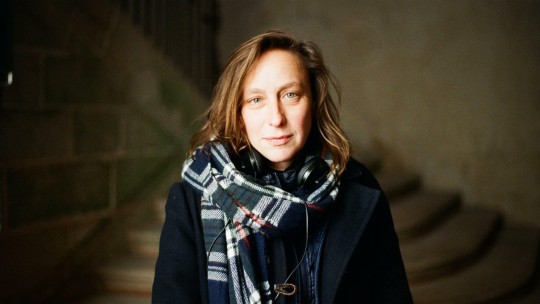
© Claire Mathon
Translated interview with Director Sciamma
‘We started a culture war‘
Andreas Busche and Nadine Lange, in: Der Tagesspiegel, 29th of October 2019
Additions or clarifications for translating purposes are denoted as [T: …]
Manifest on the female gaze: Céline Sciamma speaks about her period film ‘Portrait of a Lady on Fire’, MeToo in France and queer visibility.
In France, Céline Sciamma, born in 1978, is already revered as the new feminist and notably queer voice of French cinema, in the tradition of Claire Denis and Catherine Breillat. The director (‘Tomboy’, ‘Girlhood’), who writes her own screenplays, is largely unknown in [T: Germany]. This is most likely about to change with her fourth and most beautiful feature film so far. At the Cannes Film Festival, the period love story between the young painter Marianne and her model Héloïse, daughter of French aristocrats, won the Best Screenplay. Between the rugged landscape of the coast of Brittany and the candlelit interiors of an old villa, the film creates a utopia of solidarity and female desire, in which the characters of Marianne, Héloïse and Sophie the maid overcome class barriers.
Interviewers: Ms Sciamma, ‘Portrait of a Lady on Fire’ is your first period film, it takes place a few years before the French Revolution. Why is this era important for your story?
Céline Sciamma: My interest in those years came from art history. At the time, there was an unusual number of female painters, hundreds in France and across Europe. It really moved me to discover the biographies of these women, who had successful careers. They supported each other and were very political. There was for example feminist art criticism at the time.
I: Noémie Merlant plays the painter Marianne, who is commissioned to do a portrait of Héloïse, a daughter of aristocrats. There are two main themes: the representation of female painters in bourgeois society and the female gaze – and how this [T: gaze] is reflected in the art world at the time. How are these themes connected?
CS: When I went into more detail about the work of female painters in the late 18th century, I realised how much the female perspective is missing from art history. For me this is the most painful loss, which results from the elimination of the female gaze: this relates to the artwork themselves, but also to what art brings to our lives, the memory of a kind of intimacy.
I: Marianne is not based on a specific female painter. But is she representative of women at the time?
CS: I collaborated with an art sociologist, who did extensive research on this era. All biographical details for Marianne correspond to the time in which she lived. The dynamics of a biopic – a successful woman who defies societal norms – never really interested me. My film is a manifest on the female gaze. But there’s also melancholy in this process, because we have to restore something that has been ignored for a long time.
I: Why melancholy?
CS: It makes me sad, because this perspective was withheld from me all my life. That is why the scene, where Marianne, Héloïse and Sophie the maid re-enact an abortion, is so important for the film. By painting an abortion, the act becomes art and is therefore represented. Art gives women the opportunity to tell their own stories. But it’s not only about the past. The topic of abortion is still virtually invisible in cinema.
I: How do you deal with this lack of female perspectives as a screenwriter and director?
CS: I was aware about the lack of queer and lesbian representation in cinema early on. But it becomes dangerous, when we don’t realise anymore that something is withheld from us. I noticed this again, when I watched ‘Wonder Woman’ by Patty Jenkins. It is hard to express how you feel when you know you’re not represented, and at the same time are oblivious to the power it can give you to recognise yourself in cinema. That was a new experience for me.
I: You were one of the initiators of the 50/50 by 2020 movement, which is committed to gender parity at festivals and in film. What do you expect from Cannes next year?
CS: I’m glad that this topic is finally taken seriously. We set out our target for Cannes and want more transparency in the selection committee. However, to achieve these, you have to introduce quota. The board will be replaced [T: next] year, let’s see how it works. We started a culture war. One of the most important things for me is the work on inclusion. The 50/50 [T: movement] and the film production/promotion agency CNC created a fund for cultural diversity in [T: film] productions last year. There’s usually less budget for films made by female directors, this inequality will be slightly mitigated. More than 20 films have already benefitted from this fund.
I: There is progress on one hand, but on the other hand some things are deteriorating again. Do you see it in a similar way?
CS: We had no MeToo-debate in France, unlike the one in the US. The [T: debate] was quickly hijacked and reinterpreted as discussion about free speech: that feminist film criticism would lead to a new form of censorship. You could feel the backlash in France. A good example: Sandra Muller, who created the French MeToo movement ‘Balance ton Porc’ [T: ‘Denounce your pig’, see here for the evolution of the term ‘pig’ in this context] just lost a libel lawsuit. Action was filed by the man, whose harassing statements she made public. The level of societal discourse is not where it’s supposed to be.
I: You lead by example: There are mainly women working on your sets.
CS: It creates a different atmosphere, that is for sure. But I’ll tell you something: Women only make up 50% of the crew, my crew is probably one of the most diverse in France. Claire Mathon is my cinematographer, but a lot of men work with her. My cutter is a man though. It’s about the right balance. The film world is very much dominated by men, but I don’t want to exclude anyone.
I: In Cannes, you said something similar about your colleague Abdellatif Kechiche, who was criticised for his voyeuristic gaze on women, for example in the Palm d’Or winner ‘Blue is the Warmest Colour’. Do you want a cinema, in which your and his gaze can exist side by side?
CS: We have to be conscious about our perspective. In France, I’m always asked about my female gaze, but no one is ever asking a [T: male] filmmaker about his male gaze. Which is still considered as gender neutral. Of course, you can love ‘Blue is the Warmest Colour’ as much as you love ‘Portrait of a Lady on Fire’ [T: 😈], otherwise cinema will become a battlefield of ideologies. We just have to learn to read the images correctly. I would like to invite Abdellatif Kechiche to this relatively new discourse. But he should be asked the same questions as me.
I: You call ‘Portrait of a Lady on Fire’ a manifest on the female gaze. What does that mean?
CS: It starts with the screenplay. I wanted to tell a love story on equal terms. There is no gender-specific power imbalance in the film. That was important for me, especially in a time, in which gender inequality was the social norm. There is also no intellectual dominance between Marianne and Héloïse, they both come from the upper class, are sophisticated and self-determined. Between them, they did not have to negotiate a status.
I: What role did your actresses play in this?
CS: I wrote the film for Adèle Haenel. But it only works if she has a partner who is equal to her. Noémie Merlant is about the same age as Adèle, they are even the same height, which cannot be underestimated in cinema. That’s why shorter actors often have to stand on a pedestal. All these considerations are political, but they are also an offer to the audience: for new emotions, for surprises. Equality creates freedom, because social rules are overturned.
I: As Marianne, Héloïse and Sophie keep to themselves, they are not exposed to the male gaze. They can move freely.
CS: That’s why I don’t think of my film as social utopia. Every utopia is based on our experiences and ideas. You cannot easily find this kind of solidarity among women, you have to create this freedom. That’s why I decided to exclude male characters. What I exclude from the shot also defines what is shown in the picture. That’s the power of cinema.
I: Your film is about the visibility of women. They tell each other, how they see one another – and thus create an image of themselves. At the same time, desire arises from their gazes. How do you create this feeling of intimacy?
CS: We offer a philosophy and politics of love. Even the depiction of queer sexuality in cinema is based on heterosexual paradigms. We first had to learn how to deconstruct this gaze on us. Similarly, it’s also about abolishing the outdated ideal of the muse. There is of course a hierarchy on set, but we tried to transfer the working relationships in the film to our shooting.
I: All your films have queer aspects. Do you ever had any problems to fund your films?
CS: No, but that’s because I don’t need so much money. ‘Portrait of a Lady on Fire’ did cost 4 Million Euros. If I had asked for 12 Million Euros, it might have been different. I can’t complain. I live in a country, in which I can make these kinds of films and be radical. 23 percent of French films are made by female directors.
I: It seems like there were more [T: female directors] recently?
CS: No, the figure has been constant for 20 years. We are just forgotten and then ‘rediscovered’. Think about Alice Guy-Blanché, who made films at the time of Méliès [T: around the turn of last century]. She did everything by herself, used the first closeup. She literally co-invented the cinema. But like all the women, who were active at the beginning of film history, they were driven out, when it was suddenly about money.
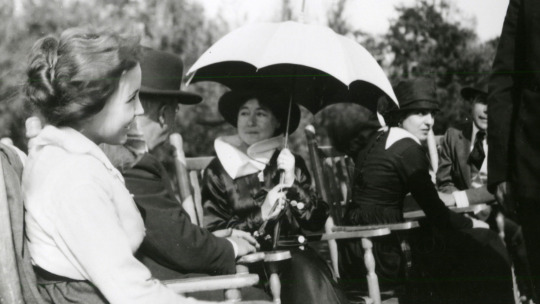
Still from ‘Be natural: The Untold Story of Alice Guy-Blaché’ (Pamela B. Green, 2018)
#Céline Sciamma#Der Tagesspiegel#2019#Portrait of a Lady on Fire#German interview#Manifest on the FEMALE GAZE#Nope on Blue is the Warmest Colour#Alice Guy-Blaché#Cinema#My translation#long post
129 notes
·
View notes
Text
Final Fantasy XV Review
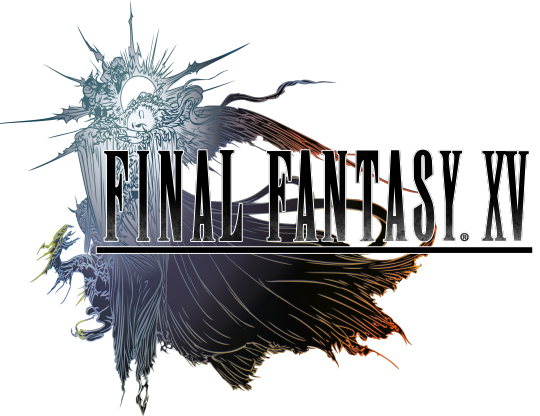
Year: 2016
Original Platform: PlayStation 4
Also available on: PC (Steam), XBox One
Version I Played: PlayStation 4
Here we go. The final Final Fantasy review of the main single-player games. I just want to say, first off, we’ve been waiting for this game since 2006. It took them ten damn years to finally release this game. I clearly remember the teaser trailer they released when it was called Final Fantasy XIII Versus, and my next-door neighbor and I were so hyped for this game when we were freaking teenagers. After years of delays, Square Enix revamped it into Final Fantasy XV.
Did it live up to the wait? Well, read and find out.
Synopsis:
Noctis Lucis Caelum is the heir to the throne of the kingdom of Lucis. On his birthday, he sets off with his three best friends and bodyguards (Ignis, Prompto, Gladio) to marry his betrothed, Lunafreya. The marriage is supposed to be a political one, though Noct and Lunafreya had grown up together and become fond of each other. But peace turns to war as the empire of Niflheim betrays Insomnia and invades. Noct, now on the run, has to reclaim his right to the throne by collecting the necessary family heirlooms which will banish the darkness.
Gameplay:
Open-world Final Fantasy.
That is the big selling point for this game.
A MASSIVE step up from Final Fantasy XIII’s gameplay, Final Fantasy XV has you roaming around and attacking enemies on the field in real time. The battle system returns to something slightly more conventional by having you cast spells and use items. It seems like this is what Square really intended to do after Final Fantasy XII. Looking back, Final Fantasy XIII feels like some prototype before Final Fantasy XII, so it really becomes apparent that Final Fantasy XIII’s gameplay comes off as a huge mistake.
This game’s major’s strength comes from the player engaging with a massive world. You camp. You take on hunts. You take on a bajillion sidequests. You run across the world. You drive across the world. You can ride a chocobo across the world.


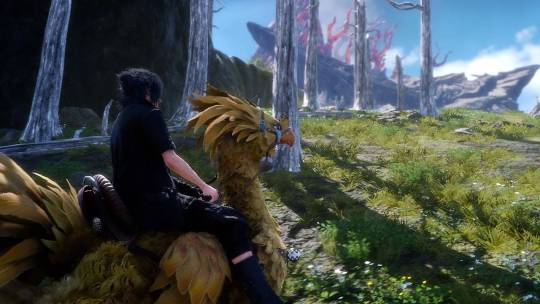
However, the dip in the gameplay comes from how easily accessible these sidequests are. The map tells you exactly where you go 24/7. I started to have an existential crisis around my 50th sidequest in a row. Why am I doing this? What’s the point? I go here to kill a thing, or go there to help someone by giving a potion or taking a picture. You start to realize that a good bulk of sidequests are either hunting daemons or fetching an item. You start to deconstruct the meaning of playing a video game as you think to yourself, “Why do I play video games?” while also thinking “But wait, one more and then I swear I’m done.”.

I get it, not everyone has the time nowadays to figure out a huge game like this. I get it, video games are now marketed to everyone for ease. At the same time, I personally love a good challenge. I mean, I’m the guy who has Dark Souls as one of his favorite video games of all time, so my opinion on the matter might definitely be skewered compared to most. I generally want to feel like I actually figured something out by myself rather than following a tracker on the screen and walking from task to task and then saying, “Okay done. Next.”.
Too much of that and playing a video game starts to feel like a 9 to 5 job to me. This game is great to play during quarantine, but at one point I saw playing this game as feeling like an actual job. Wake up, eat breakfast, time to hunt some daemons.
This is the growing conflict some people have with story-driven games versus open-world games. I see the argument focused too much on words like “linear”, but in reality we should be talking about “automation”. If a video game is too automated, then did you really play a video game? Or did you watch a movie that allows you to control the camera angle? At first, the idea of driving around an open-world Final Fantasy game sounds amazing. Isn’t that what fans always dreamed of? In reality, you don’t really drive around at your leisure. Even when you have the car set to “manual”, you can’t speed up, drive off-road, or pull off a sick drift like in The Fast and the Furious. Your car still automatically stays on the road wherever you’re going. It’s not so much “manual” as it is “I can control where and when to stop and which road to take”. Riding chocobos at your leisure is much more fun, but becomes increasingly impractical as you can just fast-travel to necessary locations in your car.
The sights and sounds of the fictional world of Eos are enough to gloss over these shortcomings though. It IS still fun to roam around and fight monsters and save the day. My bottom line is, “You don’t think about just how mindless the tasks are unless you keep playing for many days straight.”. And I poured hours into this game day after day because of the 2020 pandemic quarantine.
Graphics:
Obviously the best thus far. However, in-game facial expressions on the NPCs are still quite stilted and awkward. This game made me realize that we’ve yet to jump a hurdle when it comes to in-game graphics. The game is so polished but there are still limitations when it comes to giving the characters natural movements, both in body and lips. So an NPC could be shouting “WOW THAT’S AMAZING!” but have a straight face jumping up and down, despite the fact that the character model is the most realistic we’ve created so far in a video game. I was looking back at in-game cutscenes of Crisis Core: Final Fantasy VII, and found it ironic that they can portray body movements so much better, but that’s the trade-off. Less graphics power to portray realistic bodies, but the graphics power can then be allocated to focus on natural movements. Nowadays, all the graphics power is focused on making things look good, but that hardly leaves room for making things move naturally.
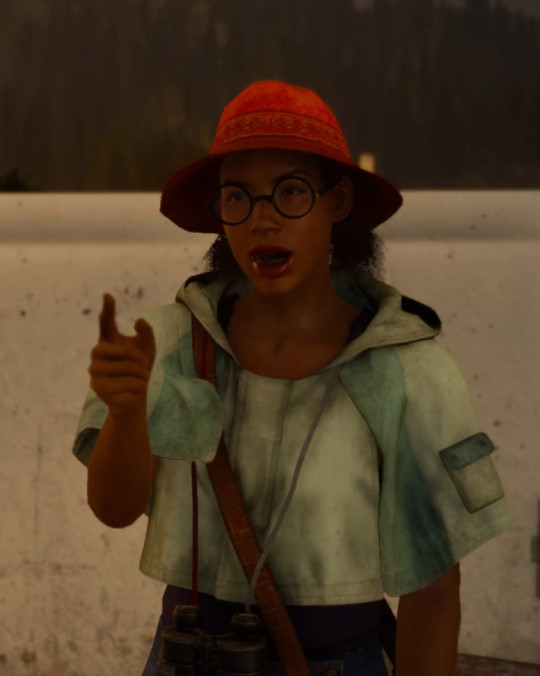
Story:
After the overly-complicated plotline of Final Fantasy XIII, Final Fantasy XV feels like a breath of fresh air. On the surface, it’s a straightforward tale of a boy seeking to become a king after his father is brutally murdered by enemy forces. The bromance between the young king and his bodyguards is endearing. Each character feels distinct and genuinely makes you laugh. The setup sounds like prime real estate for an emotionally charged storyline.
Unfortunately, it falls apart somewhere around the last quarter. What should have been a strong and straightforward story turned into a rushed, hasty mess by the final act.
The story started SO strong, they practically had it in the bag, but then it became apparent that many important elements were glossed over - especially when it came to the main villain. I realized that some things required me to read between the lines, or even were only explained in character dossiers in the archive section of the menu. Supposedly, the movie Kingsglaive: Final Fantasy XV explains more, but do you really expect me to have to watch a separate movie to understand the actual game? The final quarter of the story feels like someone was trying to finish NaNoWriMo, realized they were running out of time, and quickly jumped from scene to scene to reach that 50k word goal. The ten-year time-skip is a joke. The final chapter is sorely disappointing.
The ending was appropriate though, and even beautiful. However, the overall story didn’t have the necessary emotional weight to really make me feel anything. I thought to myself, “I feel like I should be tearing up but instead I feel nothing.”. Even Final Fantasy XII, which lacked a romance, had me swelling up at the end. Final Fantasy XV didn’t make me swell up until literally the last few seconds of the post-credits scene.
People complained about the advertising (Coleman, Cup Noodles) but that didn’t bother me.
What does bother me is the lack of variety in the main cast, and in numerous ways. There were so many interesting side characters that didn’t receive much screen time, or use at all in the story. The strong focus on only the four male leads made it a sausagefest. I was craving more out of Aranea Highwind and Iris Amicitia. They are important but don’t get any screen time at all in the final chapter, nor do we ever hear from them ever again after the time-skip. Aranea Highwind was such a cool character, but once again ends up being wasted potential.
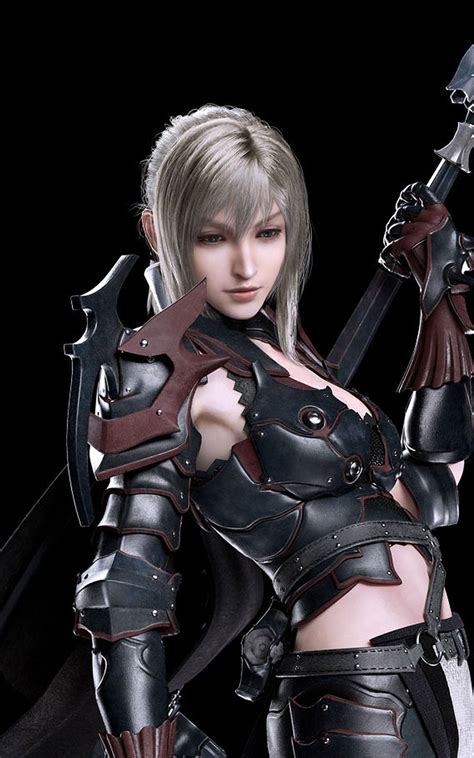
The main cast lacked distinctive styles. When I first saw the main cast, I had a hard time telling them apart. They looked like a k-pop band. Compare the main cast of Final Fantasy XV to literally any other Final Fantasy main cast and you can immediately spot the difference.

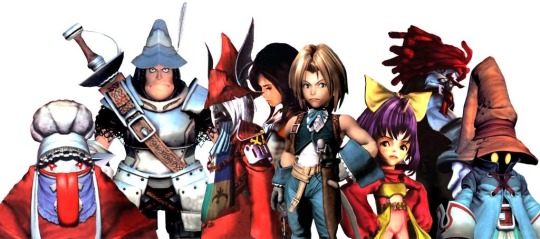
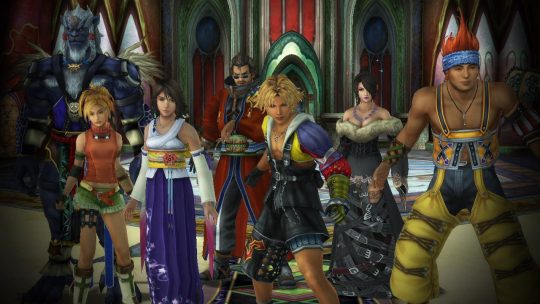
The four main leads do have distinct personalities, and I quite loved hearing their comments and banter. It felt realistic, but at times it became ridiculous. I rolled my eyes when Prompto would say things like, “Hashtag sorry not sorry.” That was a bit too on the nose, and came off as Square trying to pander to the current generation.
But what really rubbed me the wrong way is the incredible lack of non-white characters in the entire game. Lestallum feels so wrong to me as a Hispanic. Lestallum is supposed to be modeled after Havana, Cuba.
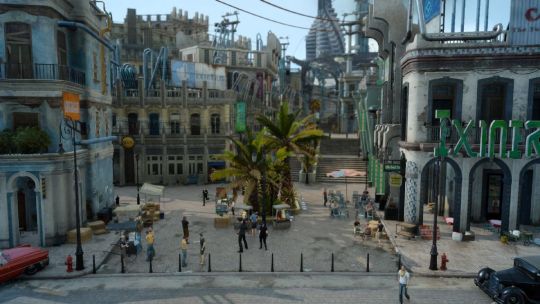
Its music, its buildings, its activities. It has a tropical climate, and yet every single denizen is pale white. Every. Single. One. I am not exaggerating. It feels so absolutely wrong walking around that city and not seeing anyone with the slightest shade of brown. This isn’t some uncalled-for SJW rant, it’s a simple fact. Tropical climates breed tanner skins. My brain naturally did a double-take when seeing the all-white population, saying, “Hmmm, something’s wrong here.”. For God’s sake, Final Fantasy XII, made over a decade earlier, did a better job at displaying the various nuances in skin tones, and that was on the PlayStation 2! Final Fantasy X, even older, seemed to properly portray tropical beach populations, inspired by the Philippines, with the character Wakka.
I noticed that they really took the time to incorporate elements from virtually every single Final Fantasy game. Aside from the crystals, the modern settings, and other obvious elements, four male leads are reminiscent of Final Fantasy III, the sinister chancellor hearkens back to Kefka from Final Fantasy VI, the enemy Yojimbo resembles Final Fantasy X’s version of Yojimbo, a certain boss battle reminded me of Cid Raines from Final Fantasy XIII.
Also, there’s Dino. Quite possibly the most annoying Final Fantasy NPC ever.
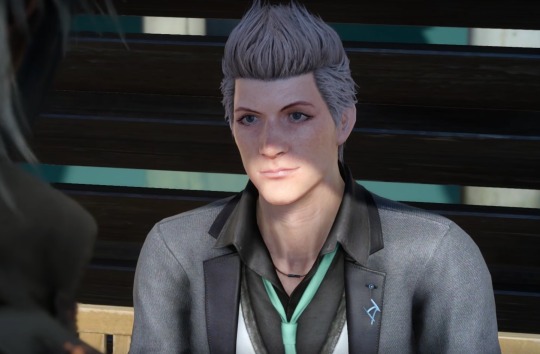
The overly obnoxious Italian stereotype made me want to punch his face, and also took me out of the experience of the fictional world. Every time you spoke with him he's all like "HEY HOW YOU DOIN WELCOME TO OLIVE GARDEN YOU TALKIN TO ME BADA BING BADA BOOM SPICY PIECE OF MEATBALL CAPISCE? AMIRITE??"
Square seemed to treat this game as a milestone in the series, alluding to everything the series ever did. It’s a shame that the story itself wasn’t quite up to snuff to be held in such regard.
Music:
The game’s major lyrical song is copyrighted, which is a first for a Final Fantasy game. It makes sense why they chose the song “Stand by Me”, both in literal and figurative terms of the story.
The score to this game is quite fantastic. The series has its first female composer, Yoko Shimomura. I have absolutely no complaints about the music. Nobuo Uematsu didn’t even pop into my head during the entire game. It’s the first time since Uematsu’s departure that I felt immersed in the score. The motifs are distinct and strong. The battle music is vibrant and an orchestral orgasm to listen to.
Notable Theme:
“Somnus”
youtube
The main theme of the game. It plays right away in the main menu. I love how it is incorporated into the rest of the score, and my brain kept wanting to hear it to its completion.
Direct Sequel?
Nope. However, there is downloadable content that fills in the gap of events within the game. Supposedly, Final Fantasy XV is loosely connected to Final Fantasy XIII and Final Fantasy Type-O, all sharing common themes and possibly set in the same universe. You can also watch the prequel movie, Kingsglaive: Final Fantasy XV.
Did it Live up to the Hype?
Eh.
Yes, and no.
It was cool to play around, but the rest is a flaccid attempt at being a notable entry in the series “for fans and first-timers”, as the words proudly display every time you load the game. It’s not the worst in the series, but certainly not the best. It’s somewhere in the mid-to-low tier.
#final fantasy#final fantasy xv#square enix#ps4#fantasy#fantasy rpg#rpg video game#rpg#video games#onvideogames#noctis#ignis scientia#prompto argentum#gladiolus amicitia#aranea highwind
15 notes
·
View notes
Text
Luffa Story Arc Breakdown
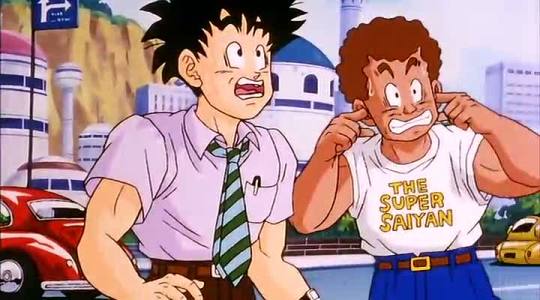
“Ah shit, he’s talking about his OC again! I told you not to wear that shirt!”
“Hey, sun’s out, guns out, my dude.”
I should have #159 up shortly, and this weekend I gotta get 160 figured out. July is my next writing month, and I’ll be trying to add 30000 more words to this damn story. But I still have to figure out what to do with the loose bits that I haven’t posted from the previous writing months. It’s the same rigamorale I dealt with in 2019 and 2020, but on a much smaller scale. So I gotta nip that in the bud before it gets worse.
Every year, I think I’m going to do proper chapter summaries on AO3, and I never go through with it because it’s just a big hassle. By “hassle”, I mean I have to re-read the entire fic and catch all the spelling errors and plot holes that I missed the last time around.
Honestly, reading my own work is kind of fun sometimes, provided enough time has passed that I can get some distance from it. Someone will like an old post of mine, and I’ll check it out to remember what it was, and Tumblr Mobile will recommend other posts of mine, including my own fic, and I’ll check it out and go “Hey, this guy’s pretty good.”
I need to tell myself that more often, because these recent chapters I’ve been posting just feel like noise. I’ll read ‘em and they look right and I see nothing else that needs to be changed, but I just can’t stand looking at them, and I know that’s just Editing Fatigue because I had a blast writing all this Frieza stuff. Back in January, I found a YouTube video that was just a supercut of the Frieza fight before Goku showed up, and I’d put that on and work out how to cram a time traveler into it. Then I found another supercut of Frieza vs. Base Goku and did the same thing in April. That may be what makes it so boring for me to read. It’s not just that I wrote it, but I adapted scenes from another work that I already saw, and recently. Hell, a few weeks ago I re- watched the Frieza Saga again, because I was hunting for Track M814 uses. So it feels dull even though I know it’s hot stuff, so maybe I should re-read my older material for an ego boost.
But I’m not gonna do that right now, because I’ve got a lot to do today. Instead I’ll be trying to sort the chapters into “arcs”. I’m hoping this will get me a step closer to whatever it is that I need to do.
Luffa #1-10: The origin story, to keep it simple. I did a prologue in #1 to introduce the character, and I think I gave her a gold breastplate, like a Roman Soldier would wear, because I had this goofy idea about constantly switching her outfits that didn’t last. Then we flash back to Luffa’s time on Dorlu Prime, her failed defense of that world from an invasion force, and her unlikely escape from captivity. Also, the title character turns into the titular Super Saiyan, thereby fufilling the titular legend.
Luffa #11-16: Bigreen Arc. Luffa can’t control her new form, so she ends up on a planet that specializes in medical science to figure out what’s wrong with her. This one is designed to explain some of the disconnects in Saiyan lore. Luffa’s not the first Super Saiyan, but she’s not even sort of familiar with the transformation, even though she’s heard tales of all the old heroes. So this arc tries to fill in that gap.
Luffa #17-23: Overnight Sensation. Luffa has to figure out what to do with herself now that she has this Super Saiyan power. She tries to go back to mercenary work, only to find it as boring as it is profitable. So she starts asking herself what she really wants (revenge), and how she plans to get it (founding an interstellar Federation).
Luffa #24-28: Luffa’s increasing popularity frightens her old enemies and attracts the attention of new ones. As Kandai flees in search of refuge from Luffa’s wrath, an old acquaintance shows up to reconnect with Luffa in an unexpected way.
Luffa #29-37: None So Blind. As Kandai becomes entangled in the political upheaval on Planet Goldwall, Luffa is drawn away from her new Federation project by seductive new power, one that promises an escape from her old problems, but at the price of her very identity. Meanwhile, the Federation is invaded by a powerful enemy from across the stars. Can Luffa return in time to deal with this new threat. Will she even want to?
Luffa #38-49: Liberation of Extraliga. Luffa launches a counterstrike on the occupied world of Extraliga, then takes the fight to the invaders. Her offensive leads her to Kandai, but she also has to contend with the Shockmaster. Can she defeat them both, or will she have to choose?
Luffa #50-60: Training Arc. Well, not just training, but I wanted a lull between the first Shockmaster arc and the second, and this is it. I did a lot of fun stuff here. Luffa drinks a whole bottle of waffle batter, Zatte gets into a Stand Battle, the characters from an old Dungeons and Dragons ad make a cameo appearance, the Shockmaster gets an origin story, and oh, Luffa might have gotten a little married somewhere in this mess.
Luffa #61-69: Second Extraliga War. The Shockmaster invades the Federation again, begging the question of why he should want it so badly. This time, he conducts his business in person, but Luffa is read for him. Or is she?
Luffa #70-76: The Luffa Way Arc. Long story short, I needed an arc to explain why Luffa never taught any other Saiyans how to transform the way she can. For one thing, most Saiyans are too afraid or resentful of her to want to learn. In this story, Luffa meets a small band of Saiyans who accept her teachings, but it still doesn’t work out.
Luffa #77-96: Pozet Arc. The King of Planet Saiya finally reaches out to Luffa for reconciliation, and Zatte convinces her to accept the invitation. But it turns out the King wants more than just friendship. Rehval has a problem, one that concerns the entire Saiyan population, and he is convinced that only Luffa can help him solve it.
Luffa #97-100: I’ll be real with you chief, this is just a collection of one-offs I wrote before moving on to the next arc. First, Rehval’s wayward daughter, Princess Seltiss, has her own plans for the future of the Saiyan people, and she and her boyfriend take the first step in making them a reality. Next, Zatte dictates a letter to her marriage counselor. Then Luffa tries to figure out whatevr happened to Drang Dedruhn. Finally, on the world of Archeo, Phyper Notro plots to deconstruct the legend of Luffa, only to discover the truth is much more dangerous than the rumors.
Luffa #101-108: Trismegistus Arc. While Luffa persecutes the Saiyans for any leads to track down King Rehval, a group of Saiyans searches for a mysterious alchemist rumored to possess a secret potion that will give them incredible power.
Luffa #109-117: Jindan War, Part 1. The Jindan Cult launches an attack on the Federation, and Luffa cannot take the fight to the enemy, since she doesn’t know where their secret base is. Unable to defend multiple Federation planets at the same time, Luffa reluctantly accepts an alliance with Princess Seltiss, leader of the Saiyan Free Company. Seltiss fears that the mysterious Trismegistus may unravel her father’s work to unite the Saiyan species, but her only hope of defeating the cult is to win Luffa’s trust.
Luffa #118-130: Jindan War Part 2. The war continues, with neither side able to gain a clear advantage. Luffa and her allies manage to repel the invaders, but are worn down in the process. The Federation grows weary of Luffa’s inability to end the conflict, and the only one who seems pleased is Trismegistus, despite the high casualties and lack of tactical gains. Eventually, his followers begin to question his motives, but do they have the courage to take action when they discover the answers?
Luffa #131-141: Jindan War Part 3. Luffa learns the location of Trismegistus’ headquarters, and assembles a fleet powerful enough to crush him in a single attack. Can Trismegistus survive her offensive? And can the universe survive the outcome of this battle?
Luffa #142-146: Xenoversal. In the distant future, a wish is made for a powerful warrior to defend time itself. And so, Luffa is recruited to join the Time Patrol, led by the Supreme Kai of Time, and the mysterious swordsman Trunks. But where is she exactly, and when? Can she ever return home? Is there even a home to return to?
Luffa #147-156: Ginyu Force Arc. Luffa now knows how far in the future she’s traveled, and her Time Patrol work seems to be the only thing left that can give her life any purpose. But can she even accomplish the dangerous missions that lie ahead? Trunks has his doubts...
Luffa #157-161: Frieza Arc. Uh, yeah, she fights Frieza in this one. It probably speaks for itself. I’m trying to remember a particular moment that happens in the Frieza conflict that would be of great importance to Luffa, but I’m drawing a blank. Sorry.
1 note
·
View note
Text
Philip Purser-Hallard Q&A
Our final Q&A is with Forgotten Lives’ editor Philip Purser-Hallard. His story for the book, ‘House of Images’, features the Robert Banks Stewart Doctor, and opens like this:
‘The usual dreadful creaking and bellowing from the rooms above the dusty office informed me that the Doctor would soon be coming down to check on my progress. I really don’t know what he does up there to make that racket. If you asked me, I’d have to guess that he’s trying to invent a mechanical walrus, and enjoying some success.
‘Honestly, Auntie, I wouldn’t put it past him. My employer is a strange man, with obsessive interests and a deeply peculiar sense of humour.’
FL: Tell us a little about yourself.
PPH: I’m a middle-aged writer, editor and Doctor Who fan; also a husband, father, vegetarian, cat-lover, beer-drinker and board games geek.
A couple of decades ago I wrote stories for some of the earliest Doctor Who charity ‘fanthologies’, Perfect Timing 2 and Walking in Eternity (whose co-editor, Jay Eales, has contributed to Forgotten Lives). These led directly to my published work in multiple Doctor Who spinoff and tie-in series, starting with Faction Paradox.
Since then, among other things, I’ve written a trilogy of urban fantasy political thrillers for Snowbooks, and two Sherlock Holmes novels for Titan Books. I’ve also edited six volumes of fiction for Obverse Books, in the City of the Saved and Iris Wildthyme series. And I founded, coedit, and have written two-and-a-half books for, The Black Archive, Obverse’s series of critical monographs on individual Doctor Who stories. (Mine are on Battlefield, Human Nature / The Family of Blood and Dark Water / Death in Heaven.)
But those two anthologies are where it all started.
FL: How did you conceive this project?
PPH: I’m fascinated by unconventional approaches to Doctor Who, an interest fostered by three decades spent reading the Virgin New Adventures, the BBC Eighth Doctor Adventures and such experimental spinoffs as Faction Paradox and Iris Wildthyme. (Again, I’m glad to have worked with alumni of those series, including Simon Bucher-Jones and Lance Parkin, on Forgotten Lives.) I love the Doctor Who extended universe when it’s at its most radical, questioning, deconstructive and subversive. The Morbius Doctors, standing outside the canon with a foot in the door, are a great vehicle for exploring that.
Once I had the idea for the anthology, the charitable cause followed naturally. These are the lives that the later Doctors have forgotten, and that loss of identity and memory could only put me in mind of the experience of my grandmother, who lived with Alzheimer’s for many years before her death. Gran was a shrewd, intelligent woman, and it was deeply upsetting to see her faculties steadily deserting her. All charities are going through straitened times at the moment, of course, and all of them are in need of extra support, but I felt Alzheimer’s Research UK was particularly worth my time and effort.
FL: Each story in the book features a different incarnation of the Doctor. Tell us about yours.
PPH: As I’ve written him, the Robert Banks Stewart Doctor is a grumpy, ebullient name-dropper with quietly brilliant detective skills and a penchant for deniable meddling. So far, so quintessentially Doctorish, but this incarnation also has an unusual interest in magic and alchemy, a long-term mission on Earth, and an old nemesis demanding his attention.
FL: These Doctors only exist in a couple of photos. How did you approach the characterisation of your incarnation?
PPH: The photo of scriptwriter Robert Banks Stewart that appears onscreen in The Brain of Morbius has a grim look on his face, but there’s another where he seems to be having a lot more fun in the costume. I played with that contrast by making his Doctor a man of excessive, rather theatrical moods, curmudgeonly and charming by turns. With his fur collar, there’s something rather bearlike about him, which made me envisage as quite physically large.
I also love Paul Hanley’s artwork for the character, where he elaborates on the costume to portray this Doctor as a kind of renaissance alchemist – Paul says ‘I like the idea that this is the Doctor who was most interested in “magic”, psychic phenomena, etc.,’ and I certainly leaned into that.
Banks Stewart’s own persona comes through in the Doctor’s Scottish accent and in some of the story choices. Both the Doctor Who scripts he wrote are set in contemporary Britain, so this Doctor’s story is a ‘contemporary’ one – though the timeframe I was envisaging for these forgotten Doctors means that works out as the 1940s. Banks Stewart created the TV detective series Bergerac and Shoestring, and so this Doctor fancies himself as a detective. And he also wrote for The Avengers (and for the Doctor and Sarah rather as if they were appearing in The Avengers), so there’s a flavour of that in the action, the whimsy, and the relationship between the Doctor and his secretary, Miss Weston.
FL: What's your story about?
PPH: The Doctor is in early-1940s London, observing the geopolitical progress of World War II on behalf of the mysterious power he represents, when he’s distracted by a burglary carried out by men bearing a close resemblance to the comedy duo Laurel and Hardy. This brings him into conflict with a figure from his past, a sorcerer known as ‘the Magus’, who represents another cosmic faction with its own agenda.
FL: The stories are intended to represent a ‘prehistory’ of Doctor Who before 1963. How did that affect your approach?
PPH: Since the eight forgotten Doctors are supposedly the incarnations preceding Hartnell, it was part of the concept from the first that these stories would reconstruct – thematically and narratively, though not in terms of TV production values – Doctor Who as it ‘would have been’ in the 1940s, 50s and early 60s. In one sense that’s a very conservative approach, but it also highlights the ways in which Doctor Who in reality has been a product of its various times.
For my own story I drew on two mid-20th-century influences – Charles Williams, a friend of CS Lewis and JRR Tolkien, who before his death in 1945 wrote occult thrillers infused with his own very eccentric brand of Christianity; and the Basil Rathbone Sherlock Holmes films set during World War II. Between them they led me to this story of a magicianly Doctor doing detective work and getting involved with affairs of state during the Blitz, and to provide him with his very own sorcerous Moriarty.
FL: Who would be your ideal casting for a pre-Hartnell Doctor?
PPH: The other authors have given most of the good answers already – Margaret Rutherford, Alec Guinness, Waris Hussein or Verity Lambert, Peter Cushing – so I’ll say either Boris Karloff or a young Mary Morris, depending on taste.
FL: What other projects are you working on at present?
PPH: I’ve got a short story and a novel for Sherlock Holmes in the works; plus another Holmes novel partly written, with a more unusual premise, that I’m trying to persuade someone to publish. I’m editing the next batch of Black Archives, of course, and writing our book on the Jodie Whittaker story The Haunting of Villa Diodati, which is due out in December 2021. And I have further ideas for original novels that I really need to devote more of my time to. One of them’s got vampires in.
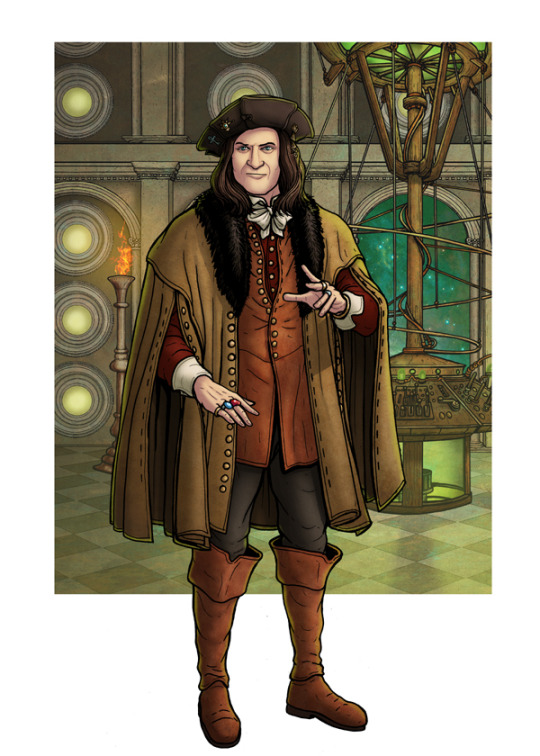
#philip purser-hallard#forgotten lives#obverse books#robert banks stewart#the banks stewart doctor#morbius doctors#the brain of morbius#doctor who#dr who#doctorwho#drwho#fanthologies#paul hanley
5 notes
·
View notes
Link
I’m picking out parts of this conversation I found especially interesting. Italics are mine:
You know, I’ve been trying to think of some precise, encapsulating question to ask you about what we’ve been witnessing over the last few weeks, and everything I was coming up with felt forced or phony. Maybe it’s better, because you’ve been eloquent during times of crisis in the past, just to ask what you’ve been thinking about and seeing in the aftermath of George Floyd’s killing? I’d like to say I’m surprised by what happened to him, but I’m not. This is a cycle, and I feel that in some ways, the issue is that we’re addressing the wrong problem. We continue to make this about the police — the how of it. How can they police? Is it about sensitivity and de-escalation training and community policing? All that can make for a less-egregious relationship between the police and people of color. But the how isn’t as important as the why, which we never address. The police are a reflection of a society. They’re not a rogue alien organization that came down to torment the black community. They’re enforcing segregation. Segregation is legally over, but it never ended. The police are, in some respects, a border patrol, and they patrol the border between the two Americas. We have that so that the rest of us don’t have to deal with it. Then that situation erupts, and we express our shock and indignation. But if we don’t address the anguish of a people, the pain of being a people who built this country through forced labor — people say, ‘‘I’m tired of everything being about race.’’ Well, imagine how [expletive] exhausting it is to live that.
Does the scale and intensity of the protests suggest some positive strides toward accountability? Maybe. Look, every advancement toward equality has come with the spilling of blood. Then, when that’s over, a defensiveness from the group that had been doing the oppressing. There’s always this begrudging sense that black people are being granted something, when it’s white people’s lack of being able to live up to the defining words of the birth of the country that is the problem. There’s a lack of recognition of the difference in our system. Chris Rock used to do a great bit: ‘‘No white person wants to change places with a black person. They don’t even want to exchange places with me, and I’m rich.’’ It’s true. There’s not a white person out there who would want to be treated like even a successful black person in this country. And if we don’t address the why of that treatment, the how is just window dressing. You know, we’re in a bizarre time of quarantine. White people lasted six weeks and then stormed a state building with rifles, shouting: ‘‘Give me liberty! This is causing economic distress! I’m not going to wear a mask, because that’s tyranny!’’ That’s six weeks versus 400 years of quarantining a race of people. The policing is an issue, but it’s the least of it. We use the police as surrogates to quarantine these racial and economic inequalities so that we don’t have to deal with them.
...we’ve got a [expletive]-up permanent campaign system with too much money in it. Don’t people know that already? The politicians don’t even know how [expletive] up their system is. Nancy Pelosi was on ‘‘The Daily Show,’’ and we were talking about how money has a corrupting influence in politics. I said, ‘‘You raised $30 million. How does that money corrupt you?’’ She said it doesn’t. So money corrupts, but not you? That’s someone within the system. And when I went down to Washington for the 9/11 victim-compensation bill, I learned something that shocked me. We had a program that was working. Bureaucratically, it wasn’t broken. What is broken about Washington isn’t the bureaucracy. It’s legislators’ ability to address the issues inherent in any society — and the reason they can’t address them is that when you have a duopoly, there is no incentive to work together to create something better. Plus, you have one party whose premise is that government is bad and whose goal is to prove that, which makes them, in essence, a double agent. All these things coalesce to make problem-solving the antithesis of what we’ve created. We’re incentivized for more extreme candidates, for more extreme partisanship, for more conflict and permanent campaigning, for corporate interests to have more influence on the process, not less. The tax code isn’t complicated because poor people have demanded that it be that way.
What do you think of the news media’s handle on this political moment more generally? I don’t think it has ever had a good handle on a political moment. It’s not designed for that. It’s designed for engagement. It’s like YouTube and Facebook: an information-laundering perpetual-radicalization machine. It’s like porn. I don’t mean that to be flip. When you were pubescent, the mere hint of a bra strap could send you into ecstasy. I’m 57 now. If it’s not two nuns and a mule, I can’t even watch it. Do you understand my point? The algorithm is not designed for thoughtful engagement and clarity. It’s designed to make you look at it longer.
Have there been any positive changes, though? Let me give you an example of what might be one: When you were doing ‘‘The Daily Show,’’ part of what made you unique was your last-sane-man-in-Crazytown quality. You would actually say that someone in power was telling a lie when the nightly newscasters wouldn’t. Now they will say that. Is that a step in the right direction? The media’s job is to deconstruct the manipulation, not to just call it a lie. It’s about informing on how something works so that you understand the lie’s purpose. What are the structural issues underneath the lie? The media shouldn’t take the political system personally, or allow its own narcissism to rise to the narcissism of the politicians, or become offended that the politicians are lying — their job is to manipulate.
How much might his administration’s response to Covid-19 hurt him in November? That’s the question the media asks. What they should be focused on is, here’s what happens when you hollow out the pandemic-response team. You have to go after the case of competence and anticorruption. The media wants to prosecute the case of offensiveness. That doesn’t matter. But there were decisions about P.P.E. and the states that were made without any federal response, and that does matter. It’s really about, what is government? Are we the Articles of Confederation? Are we the Constitution? Are we the United States? What are we? If we’re just 50 states, and if New York can push Delaware out of the way and get masks, and now Delaware has got to pay 10 times what it was going to pay — are we being led or not? It’s the wildest thing. I’ve never seen anybody who can say in the same breath, as the president does, ‘‘I am in charge, only I can fix this, and I take no responsibility.’’ You cannot process that. So what you have to process is the actual process: How do masks help? Do they help? You have to really explain it to people, but we allow the mask-wearing to be reduced to its symbolic meaning. Things like masks can’t just become another avatar of political representation. That’s where we go wrong.
This might be a little Civics 101, but I hope you’ll indulge me: A lot of your work has fundamentally been about interrogating certain truths or ideas about America and the American experiment. Things like: What does this country mean? What are its ideals and values? What’s its character? Over the last few years those questions have only become harder to contemplate in any coherent way, let alone answer. Do those questions still hold for you? Every society lies to itself to some extent. Every person does. And sometimes you have to face the truth. The truth of the American experiment is that government is messy. It’s hard to manage. We are melding cultures and religions in a way that most countries don’t. But we have an exceptionalism that we have taken for granted, and we get lost in the symbolism of who we are rather than the reality. The reality of who we are is still remarkable. You can’t take the anecdotal and pretend it’s universal. You can’t take a picture of the Lake of the Ozarks and people on top of each other drinking and say, ‘‘That’s how America responded to the pandemic.’’ Because it’s not. The boots-on-the-ground response has been phenomenally resilient and responsible and courageous. The sense that this could all turn into ‘‘Mad Max’’ tomorrow always hangs over everything — but it hasn’t. There are issues, but again, we point a spotlight on the anecdotal and pretend that it’s universal. What that does is feed the narrative for people who want to use it for their own purposes. That’s what drives me bananas. We’re basically having giant public fights about symbolism, while the reality of our situation goes unexamined.
Are you hopeful about what lies ahead? Always. Because the view we get of the country is not accurate. We get the artifice of it, the conflict of it. I’m not naïve. I don’t think that true divisions and animosities and bigotry and prejudices don’t exist. We see that every day. But fundamentally, we are a resilient and strong and resourceful nation that has oftentimes overcome our worst tendencies — ‘‘overcome’’ is probably too strong a word. But our biggest problem as humans is ignorance, not malevolence. Ignorance is an entirely curable disease.
How? Information and work. You need to talk to people. Ignorance is often cured by experience, by spending time with what you don’t understand. But I honestly don’t know. Well, you know what? I do know: In the same way that Trump’s recklessness is born out of experience, so is my optimism, because good people outweigh [expletive] people. By a long shot.
#the good people have to be in control tho to speak to the last two sentences#the weight of the good must be felt#but 'you can't take the anecdotal and pretend it's universal' is!!!#'we're basically having giant public fights about symbolism'#yes#b/c it's listless insanity there's no one at any wheel#being able to succinctly discuss topics like this is a hell of a thing#i don't rly care to tag this and have randos interact#'an information-laundering perpetual-radicalization machine' is also twitter dot com#and like... all of social media#anyway#long post
7 notes
·
View notes
Text
The rulers of the forest: The witches of His Dark Materials and Scandinavian folklore
Spoiler warning: All of the His Dark Materials books, and one tiny spoiler from The Secret Commonwealth
Beautiful, supernatural, and gets PISSED if you turn down their advances. I could very well be describing the witches from His Dark Materials, but I could also be describing the Skogsrå of Scandinavian mythology. Skogsrå means “ruler of the forest” and is one of several similar mythological beings in Scandinavian folklore (there is also the Sjörå, ruler of the lake/sea, and Bergsrå, ruler of the mountain). The Skogsrå, as well as the other rå, can be likened to the fairies of English mythology (Häll 2013, 62). She, because she is always a woman, appears walking alone in the forest, looking beautiful, and often tries to seduce the men who meet her (Harjunen 2019). However, she often has some sort of physical deformity (that she tries to hide), such as a tail or having a rotting tree trunk for a back.

Source: https://sv.m.wikipedia.org/wiki/Skogsr%C3%A5et#/media/Fil%3ASkogsr%C3%A5_med_ih%C3%A5lig_rygg.jpg
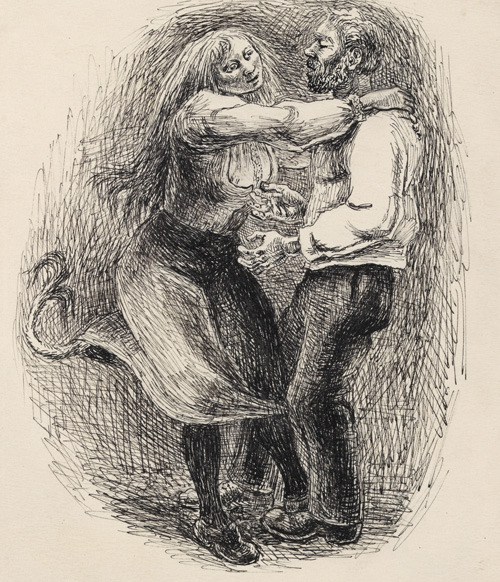
Source: https://www.isof.se/om-oss/for-dig-i-skolan/arkivvaskan/skogsraet-i-folktron.html
Those who pleased her (by having sex with her, or for instance by helping her with the animals she kept) were generally given some sort of boon, such as luck in hunting or fishing (Häll 2013, 129). If you did not do as she wanted, however, you could expect some sort of punishment (ibid, 345). Having sex with her, was not always a good idea, however. Those who did so could often come away from the encounter feeling sick (ibid, 378). It could also lead to a feeling of emasculation since these women were the dominant partner in the relationship (Harjunen 2019). Sometimes this was literal too, with the men losing their genitalia or it being damaged in some way.
Now, I feel like the witches of His Dark Materials share many traits with the Skogsrå. Firstly, they’re both described as beautiful women who are connected to the forest; when we first hear of the witches, we learn that “They live in forests and on the tundra. Their business is with the wild.” (Pullman 2011a, 165). They are consistently described as beautiful (ex: Pullman 2011a, 300; Pullman 2011b; 49 & 118). Similarly, the Skogsrå is the ruler of the forest, and it is also there one might encounter her (Harjunen 2019). Harjunen writes that the forest often was considered to be the borderland between the safe, human, world and the unknown world of the supernatural. The forest was also often coded as female, and as something that should be conquered by men (for instance by hunting the animals in it).
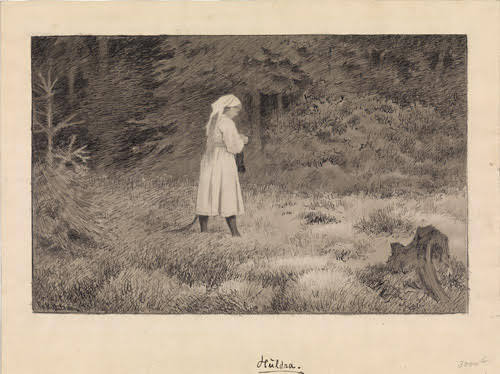
Source: https://www.isof.se/om-oss/for-dig-i-skolan/arkivvaskan/skogsraet-i-folktron.html
Here you can also see a connection between the wildness of the forest and the wildness of the Skogsrå’s sexuality. Häll notes that this was a great contrast to the gender norms of premodern Sweden and the ideal femininity where women were supposed to be virtuous (2013, 401). This leads me to my second point: as one might expect, the church was hardly a fan of the Skogrå and similar beings. They were seen during the 15th and 16th century to be Satan’s creatures, and to have sex with them (as some men claimed that they had) were likened to having sex with the devil (ibid 251). Similarly, there is most definitely a conflict between the witches’ way of life and that of the church in His Dark Materials. As Ruta Skadi notes about the church in The Subtle Knife: “For all its history (…) it has tried to suppress and control every natural impulse. (…) That is what the church does, and every church is the same: control, destroy, obliterate every good feeling.” (Pullman 2011b, 50) (Side note: Is Ruta basically a Marxist? This might have to be another essay at some point.) I’ve written before on the church’s attempts to control sexuality in His Dark Materials, if anyone is interested in that. We get another glimpse at the church’s view on witches when Will meets a priest in The Amber Spyglass who tells him this:
“the witches- daughters of evil! The church should have put them all to death many years ago. Witches- have nothing to do with them, Will Ivanovitch, you hear me? You know what they will do when you come to the right age? They will try to seduce you. They will use all the soft cunning deceitful ways they have, their flesh, their soft skin, their sweet voices, and they will take your seed- you know what I mean by that- they will drain you and leave you hollow! They will take your future, your children, and leave you nothing.” (Pullman 2011c, 100).
The priest here echoes a lot of the Christian views on the Skogsrå in Sweden; linking them to the devil and describing them as seductresses. His sentiments are also similar to how the Skogsrå was seen as someone who might bring illness and emasculate her male lovers (Harjunen 2019). Harjunen also makes the interesting point that those who have sex with a Skogsrå might be seen as “queer by association” (ibid, 47). This is because the Skogsrå, as a forest spirit and a woman breaking gender norms, was seen as a kind of queer being. In a similar line of thinking, Häll writes that in the eyes of the church, having sex with a Skogsrå were often considered to be sodomy (2013, 200). All in all, those who had sex with a Skogsrå could be considered to not be “real men” because they engaged in sexual behavior that was not heteronormative. A similar point is raised by the priest in The Amber Spyglass when he claims that the witches will take men’s seed, and thus take their children and future. The man will then not be able to live up to the heteronormative ideal of having a wife and fathering children.
Now, I want to look at the thing that first made me consider this connection between the witches and the Skogsrå; the giving of favors or punishment. When we’re first introduced to the witches, we learn that they might be inclined to help our heroes, because “there’s an obligation there” after Fader Coram helped save Serafina Pekkala’s life (Pullman 2011a, 163). Similarly, in The Secret Commonwealth (TINY SPOILER), we learn about a witch in Sala silver mine (a real place by the way) who helped some miners heal from illness, and they in return helped her when her cloud-pine went missing (Pullman 2019, 345). This story is very similar to the way a Skogsrå or Bergsrå might help forest workers or miners.

(Note the tail) Source: https://sv.m.wikipedia.org/wiki/Skogsr%C3%A5et#/media/Fil%3ATroll_woman.gif
But unfortunately, we also get stories a plenty of what happens when you spurn a witch. As a seal-hunter puts it like this to Lee in The Subtle Knife: “A witch offers you her love, you should take it. If you don’t, it’s your own fault if bad things happen to you. It’s like having to make a choice: a blessing or a curse.” (Pullman 2011, 118). This is consistent with how the Skogsrå is described; if you do what she wants she will reward you (for instance by giving you luck with hunting or curing an illness), but if you reject her, she will punish you (Häll 2013, 345). This latter outcome is seen in The Subtle Knife when the witch Juta Kamainen kills Stanislaus Grumman/John Parry for scorning her (Pullman 2011b, 321).
So, in conclusion, the Skogsrå of Scandinavian folklore have often represented a wildness, untamed nature and female sexuality. They were deemed sinful and agents of Satan by the church. They could help you if you helped them, but if you scorned them they would punish you. Similarly, the witches of His Dark Materials live in the wilderness, are very sexual, are disliked by the church for this, and can both help and punish you. What we can take from this comparison, besides the fact that Pullman might have been inspired by this folklore, is that women who, in the words of Häll, do not follow gender norms and are virtuous are a threat (2013, 401). In fact, Häll describes the Skogsrå as “the femme fatal of folklore” (my translation) (ibid, 404). This description fits the witches quite well too. I’m not sure if Pullman does enough to deconstruct this idea though. But, as I have argued in previous texts, it is interesting that female sexuality is such a big threat to the institution of the Magisterium. And since the Magisterium is the villain of the story, we should probably cheer Ruta Skadi when she calls for its destruction for its attempt to “obliterate every good feeling” (Pullman 2011b, 50). So, while I have some quibbles with how the witches are portrayed, I guess we should celebrate these femme fatales of the forest.
References
Harjunen, Catarina. 2019. “Queer Perspectives on Erotic Human-Supernatural Encounters in Finland-Swedish Folk Legends”. lambda nordica. 1/2019: 46-66
Häll, Mikael. 2013. Skogsrået, näcken och Djävulen: Erotiska naturväsen och demonisk sexualitet i 1600- och 1700-talens Sverige. Stockholm: Malört
Pullman, Philip. 2011a. Northern Lights. London: Scholastic.
Pullman, Philip. 2011b. The Subtle Knife. London: Scholastic.
Pullman, Philip. 2011c. The Amber Spyglass. London: Scholastic.
Pullman, Philip. 2019. The Secret Commonwealth. London: Penguin Random House
4 notes
·
View notes
Text
Good Deeds Gone Unpunished Review
Hey, remember when I was trying to read a bunch this year? I’m still doing that, but the books I’ve been reading don’t fit into any of my categories so they don’t count. But finally, after many months of bookish silence, I’m back with Rich Burlew’s new print book Good Deeds Gone Unpunished

Why I Read This Book
It’s difficult to talk about Good Deeds without having some background on the universe it takes part in. The Order of the Stick is a web comic that’s been running since the dawn of time (aka 2003). As seen by the cover, the art is done exclusively in stick figures. But don’t let the style fool you--Burlew has over the years perfected his craft and the art is very effective for the story he’s trying to tell. This is especially true in whenever a large crowd is on page and the simplistic style makes it easy to tell what’s going on.
The Order of the Stick started out as a gag-a-day D&D strip parodying common fantasy and roleplaying tropes. I have never played D&D in my life, and as a result the early strips don’t really do it for me, but then the story evolves into something greater. While it never leaves its D&D roots, the mechanics are quietly shuffled to the background. The comic never goes long without cracking a joke, but the overarching story changes its focus to deconstructing and then reconstructing just about every fantasy and storytelling trope under the sun.
Enter the Sapphire Guard.
The Sapphire Guard are probably the most important secondary characters that aren’t villains. A big chunk of the main comic takes place in their homeland, Azure City, and it’s here where the story really starts blooming into an epic adventure. Good Deeds Gone Unpunished is a collection of short stories starring these characters, the longest of which stars fan-favorite O-Chul in the 50 page short story How the Paladin Got His Scar. The shortest is a 9 page, dialogue-free story told from the POV of a normal house cat.
That may seem lame, but it was surprisingly heartwarming.
Two of the stories were previously Kickstarter exclusives. Another takes place in the “present day” of the comic while the rest take place in the past (hence being labeled on the spine as Book 1/2 when previous print-exclusive prequels are 0 and -1). While the main comic is in color, the print exclusives are always done in grey scale as a cost cutter.
I obviously can’t recommend this to anyone who isn’t caught up at least to Book 5 in the main comic--that’s a bit of a commitment, at over 900 strips. Luckily all of the main story strips can be found online for free. Don’t let the early strips put you off too much, but if you’re not invested in the characters by the introduction of the paladins then I’d say this probably isn’t the story for you.
My Thoughts on the Book
Good grief, that’s a lot of preamble to get to the heart of the issue. So it’s finally time for the big question: Did I enjoy Good Deeds Gone Unpunished?
The answer is yes and no.
As a Kickstarter backer, I had already read two of the five stories. I was most excited about the all-new story set in the present day. The two previous print-exclusive prequels--while not required reading to understand the main comic--dropped some pretty heavy foreshadowing for things to come. I assumed that would be the case here, and I was wrong.
It was my own fault for expecting things that hadn’t been promised, but I was still a little disappointed. The tone of the book is for the most part pretty lighthearted and fun, with some moments that tug the heartstrings. They are truly side content that in no way alters my understanding of the main comic.
There is one exception, and that is the aforementioned How the Paladin Got His Scar. Though I had already read it, it remains my favorite of all the side content Burlew has produced over the years and the highlight of the book. I would say it’s worth buying Good Deeds for this one story by itself. The rest is just icing on the cake.
As previously stated, Burlew seems intent on challenging pretty much every fantasy trope ever, and over the course of the story he’s had the opportunity to write every flavor of paladin there is--showing off the best and worst aspects of that particular class.
It isn’t much of a stretch to see how real world politics has influenced Burlew’s story, and there’s a lot to chew on in How the Paladin Got his Scar. Take the following quote, from a senior paladin to an acolyte and you’ll see what I mean.
“I am not a paladin yet, so I cannot call upon the blessed power of the Twelve Gods to determine which hobgoblins are Evil. How will I know which are fair to attack?”
“An excellent question, and I am pleased that you are giving these concerns the weight they deserve. It is important to remember simply that hobgoblins are usually Evil, and those who may not be so technically still worship an Evil God--or defend and Evil social order, or grow food for Evil warriors, or give birth to Evil children. It is enough for us to destroy their Evil society, and let any who survive reflect on the path of wickedness. Never hesitate to punish Evil, or support for Evil, or tolerance for Evil.
“Thank you, Master. You are wise, and I will do my best to follow your example.”
This is as the paladins prepare an indeterminate attack on a hobgoblin stronghold on the hunch that an Evil artifact might be present inside, thus upsetting the balance of peace in the region.
I’ll say it again, simple art =/= a simple story. Burlew is a damn good writer, and O-Chul is a fan-favorite for a reason. It’s amazing how Burlew is able to set up what seems to be an insurmountable problem that can only end in war and violence and then resolve that problem in a satisfying manner, all in fifty pages and with a hefty dose of character development along the way.
In Conclusion
If any of my followers aren’t familiar with The Order of the Stick I’d highly recommend giving it a look. If someone who knows nothing about D&D can muddle through until the main plot comes along then you know there’s something there besides the jokes (funny as those are).
If any of my followers are familiar with OotS, Good Deeds is a worthy addition to the print-only exclusives--just don’t expect plot bombs like Origin of the PCs or Start of Darkness. How the Paladin Got His Scar alone is worth the price of admission, and the rest are pretty solid, too.
8 notes
·
View notes
Text
These senior citizen YouTubers are better than anyone else on this hellscape internet
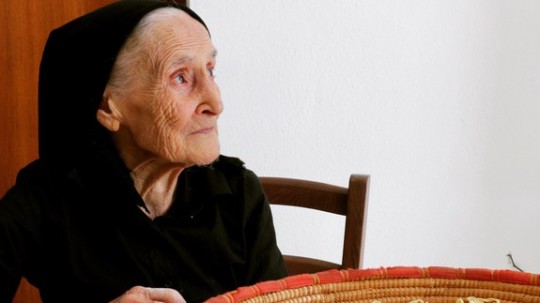
The typical YouTuber is young, obnoxious, and speaks at an above-average decibel level. They love pranks. They love covertly selling you *products.* Even though they're your age or vastly younger, they have more money in their bank account than you ever will.
Thankfully, not all YouTubers like that. This Thanksgiving, I'm grateful for the dedicated community of senior citizen YouTubers, here to make homemade pasta, deconstruct mechanical toys, play lullabies on their guitars, knit, apply make-up, and show you how to properly take a dip in the public pool.
SEE ALSO: Logan Paul isn't the only problem. YouTube is broken — here's how to fix it.
If you're going to be an influencer, at least use your power to show Xennials like me how to make proper tagliatelle.
For all their wisdom and *actual content knowledge,* senior citizen YouTube celebrities are nonetheless a rarity. The demographic data tells the story: 96% of youth aged 13 to 17 have used YouTube, compared to just 51% of those 75 and older. Just 67% of seniors aged 65 and over use the internet, and only 4 in 10 own smartphones.
So we shouldn't be shocked that of the biggest names in YouTube — Fernanfloo, PewDewPie, Germán Garmendia, Rubén Doblas Gundersen i.e. El RubiosOMG, VanossGaming, and so on — all are male, and none, absolutely none, are above the age of 30.
That doesn't mean senior citizens are absent from the platform, or that younger generations don't love to watch older folks on screen. I know that I, for one, am not alone in not wanting to hear this guy opine about suicide prevention:
You just have to look a little harder to find the elders of the community, which we kindly did for you. Here are some of the leading senior personalities on the platform:
1. Tricia Cusden, Look Fabulous for Older Women
youtube
70-year-old Tricia Cusden formally kicked off her YouTube account and her personal make-up business, Look Fabulous Forever, five years ago. Cusden specializes in make-up made specifically for older women.
Cusden remembers when her manufacturer told her to put videos of her products on Twitter:
"I thought, that's a really stupid idea," Cusden told Mashable. "Millions of videos are uploaded to YouTube, people just won't see them."
Pretty quickly, however, Cusden's videos started picking up real traffic: 1,000 views one day, 1,500 views on another. It was clear that Cusden had tapped into a real need — and that older women were (gulp!) using YouTube.
Cusden believes she was able to access this demographic because her product line was written up in print publications, which have older followers. These women presumably then followed her to YouTube.
youtube
In comparison to other brands that market token "anti-aging skincare" to older women, Cusden hopes to create a positive, stigma-free YouTube space:
"The beauty industry disdains and marginalizes this age group ... [but] we won't disparage you here," Cusden says. "We won't be negative."
Cusden's channel currently has 28,340 subscribers.
2. Judy Graham, Knitting Tips by Judy
In recent years, knitting has had something of a comeback among the millennial Etsy set. But why learn from some dumb book when you can learn from *THE* Judy Graham?
youtube
Graham is a knitting legend. She's now in her 80s, and she's still producing videos nearly every week. In 2015, Graham complained to her son that it was a myth that all seniors hated technology.
"Seniors do know about tech, and they do use it," Graham told her son, who later published her comments in USA Today.
Not everyone who watches "Knitting Tips by Judy" is older. She has plenty of younger fans (points at self).
youtube
If there's anything that Judy proves, it's that you don't have to be a young, terrible California bro in order to be successful on this nightmare platform.
3. Tim Rowett, Grand Illusions
youtube
For all the optical illusion and unusual toy fans out there (I'm assuming that's everyone on this list), Tim Rowett is your man.
Rowett's YouTube channel, Grand Illusions, collects and reviews dozens of random toys. It's whimsical and strange and exceedingly, unexpectedly popular: The channel currently has over 881,000 subscribers.
In 2015, the Telegraph named Rowett one of the best YouTubers over 50 years old.
The award was well-deserved. Is there anything more soothing than hearing a handsome older British gentleman with a BBC accent examine the mechanics of a bubble blower?
youtube
4. Pasta Grannies
youtube
There's no such thing as a dream job, except for Vicky Bennison's. Bennison is the founder of Pasta Grannies, a YouTube channel featuring Italian grandmas making their best homemade pasta.
Bennison, who is 60, literally travels all around Italy hunting for the country's most talented grandmas. Every episode, she highlights a particular grandma and their specialty pasta.
youtube
Pasta and Italian grandmas are universally beloved, which is why Bennison's show has such a diverse, cross-generational audience. These women aren't trained chefs, but they're exceptionally talented and they know what a good pasta serving size is: one gallon per person.
"What you see on television requires armies of food stylists ... These are things all people can do," Bennison told Mashable. "[It's why] I do have a broad audience ... My demographics for Pasta Grannies is 25 to 65 years old."
Some of these grannies are in their late 90s. Yet with more 341,913 subscribers, Bennison has nonetheless been able to build a digital fan base for these women.
youtube
Pasta Grannies, you are welcome in my home anytime.
5. Bossa Nakane
youtube
Though he probably wouldn't classify it this way, Bossa Nakane makes lullabies for stressed-out adults. This man is a nightingale. His music is delightfully tender: Think Nick Drake, but sung by a human robin.
Why would you ever sing "Happy Birthday" yourself when you can have the Bossa Nakane version instead? He's better.
youtube
He currently only has 3,174 subscribers. Everyone, please follow now.
6. ElderGym
youtube
ElderGym is the only YouTube fitness series on the web I'm capable of completing. A 4-minute session on how to get off the floor? This I can do. March in place for 1 minute? Hell freaking yeah. ElderGym isn't just for seniors, it's for everyone.
youtube
Squeeze your shoulders for 1 minute. Congratulations! You've exercised.
youtube
7. Grandma Shirley
youtube
Anyone who's anyone in the senior YouTuber world knows Grandma Shirley, an 82-year-old gamer who records herself playing games for YouTube, among other places. She's best known for playing Skyrim and currently has over 410,000 subscribers.
youtube
I've never understood the appeal of watching other people play games (why watch strangers play Grand Theft Auto when you can watch ... anything else) but if I'm going to watch anyone, it will be Grandma Shirley.
8. Grandpa Kitchen
Grandpa Kitchen operates a YouTube channel where he cooks enormous amounts of Indian food and feeds if to local orphans. The channel currently operates a Patreon page in order to fund their operations; however, I was unable to independently verify how that money is spent.
That being said, Grandpa Kitchen runs an excellent show. Look at all those potatoes. How can they not make you happy?
youtube
9. Gramma and Ginga
Gramma and Ginga are two sisters, one 104 years old, the other 99. They live a few blocks from one another in Clarksburg, West Virginia. If you're the type of person who loves to see two charming older women bicker non-stop about nothing, this is for you.
Think Seinfeld, but with Grandmas.
youtube
Imagine a comedy podcast but the podcast were ... actually funny. That's Gramma and Ginga.
youtube
These women currently have 325,684 subscribers. In 2016, they made it to Jimmy Kimmel Live.
10. Kevin and Lill
I tend to be skeptical of anyone on YouTube who has more than 500,000 subscribers and says they create "comedy." Historically, YouTube comedy is an art form lower than improv.
Kevin and his objectively charismatic grandma Lill are an exception to the rule. We talk a lot about YouTube personalities but Grandma Lill actually has one.
As the kids say, she destroys me.
Look at her make chocolate chip brownies with her grandson Kevin, then try to pick yourself up off the floor.
youtube
Perhaps my favorite part of the series is when she introduces the episode, saying, "Hi fellas and girls."
Just listen to it instead of reading my far inferior copy.
youtube
Grandma Lill says she didn't really know much about YouTube before her grandson turned on his camera one day in the car:
"I was surprised, but I said, 'Hey that's good!'" Lill told Mashable.
You'd think that Grandma Lill would be an inspiration to her friends, many of whom are in the same age bracket.
Grandma Lill doesn't think so.
"My girlfriends if they don’t have grandchildren [with access to technology] — they could care less about what I do! They don't care where I'm going. They don't have YouTube, Instagram."
She also doesn't particularly care how they feel. If there's someone out there she can inspire — even if it's not her best girlfriends, even if it's just herself — she's happy these videos exist.
"It keeps me younger," Lill told Mashable. "I feel like 65 instead of 88 now. Nobody can believe I'm 88 ... We're just so good."
A heartfelt thanks to *65*-year-old Grandma Lill and all the YouTubers like her.
WATCH: 3Doodler Create Plus is the perfect pen for creative techies — Power Up

#_uuid:37dff8ed-df14-32fc-abcb-63eefe1d0ec5#_author:Heather Dockray#_category:yct:001000002#_lmsid:a0Vd000000DTrEpEAL#_revsp:news.mashable
1 note
·
View note
Text
Abortion Masterpost: How To Argue Pro Choice
Lately, I’ve seen a lot of faulty pro choice arguments, so I just want to review a couple of points that we should be making. This post will be followed up by examples and deconstructions of faulty pro choice arguments as well. (Note: bold = anti choice argument, regular text = pro)
1) “Abortion is murder!!”
- There are three ways to define life: a) any being with cells, b) two or more fertilized human cells, or c) a born person, and possibly a viable fetus. Ask the anti which definition they’re using (we already know that) and ask them to explain, in medical terms, where and why they believe life begins wherever they believe it does.
- If you reach an agreement with them that a fetus is alive (which very well may happen - there’s no denying that even blastocysts are alive, even if they aren’t people with human rights), it’s time to get into legal terms. For starters, abortion cannot possibly be murder, because murder is:
Intentional. Murder is the intentional taking of a human life; however, this argument is flawed because the purpose of abortion is not to kill, but rather to make a pregnant person no longer pregnant. If there were a way to make a pregnant person un-pregnant instantly without the fetus dying, that would be great - but there isn’t. Fetuses simply aren’t viable when 99% of abortions take place, and pregnancies can’t be transferred.
Premeditated. In this one, yes, you could argue that abortion is “premeditated” in that it is usually planned out in the form of an appointment at a clinic. But that is irrelevant because murder must also be:
Done out of malice. Sorry, anti-choicers, but people don’t walk into an abortion clinic thinking, ‘gee, am I excited to kill that damn fetus today!’. They just don’t. People don’t have abortions out of a desire to hurt an embryo - people have abortions because they don’t want to be pregnant.
If something does not meet these three conditions, it cannot legally be considered murder. Thus, abortion is definitely the termination of a pregnancy, but seeing as that the intent is termination and not killing, it is by no means murder.
2) But the impact is the same! Even if it’s not murder, it still ends a human life!!
Yes, it does result in the death of a zygote, embryo, or fetus. We can agree on that. See Bodily Autonomy at the very bottom, or check out these posts. X X X
3) But what about adoption?!?!
Adoption is a great option for people who don’t want to raise a child, but it doesn’t do much for people who do not or cannot be pregnant for nine months. It’s a way to avoid having to raise a child, but it still means a person has to carry a pregnancy for nine months.
4) Yeah, well we’re talking your comfort for nine months vs. a human life!!
Pregnancy is incredibly taxing on the body and people with physical or mental health conditions may not be able to handle pregnancy. Straight from the US National Library of Medicine: The pregnancy-associated mortality rate among women who delivered live neonates was 8.8 deaths per 100,000 live births. The mortality rate related to induced abortion was 0.6 deaths per 100,000 abortions. The risk of death associated with childbirth is approximately 14 times higher than that with abortion.
5) But the chances of the mother dying are so slim, but with abortion, the chance of the fetus dying is 100%! It’s better to risk one human life than to deliberately, certainly terminate another.
That is not your decision to make. Period. Who do you think you are, to tell someone you don’t even know that they should risk their lives in order to push out a baby in nine months? If people don’t want to risk their own life, that’s a perfectly acceptable and understandable choice that they can make with no moral qualms.
6) Well, they consented to this risk when they had sex. If they didn’t want to get pregnant, maybe they should have kept their legs closed!
a) So, how so you feel about rape victims who get abortions? Do you support a rape exception for abortion?
b) Just like consent to kissing is not consent to sex, or like consent to driving in a car is not consent to being killed in a car accident, consent to sex is not consent to pregnancy. Consent is not transferable (aka. consent to one thing is not consent to another) and by implying that it is, you are actively contributing to rape culture.
c) Acknowledging the risk of something is not the same thing as consenting to that risk. Every day, when I get in my car, I acknowledge the risk that I could be killed in a car accident while on the road. But if I should, indeed, get in an accident, I would not be denied medical care simply because “maybe I should have walked instead”. Even if I wasn’t wearing a seatbelt at the time the accident occurred, nobody would deny me lifesaving surgery just because I was irresponsible and failed to protect myself.
7) Yes, of course I support a rape exception. Rape victims are traumatized.
How is a fetus conceived in rape any different than a fetus concieved in consensual sex? I thought we were worried about the fetus, the “unborn child”, the “innocent life”. Suddenly, the value of that life is contingent upon the way it was conceived? That doesn’t sound like your priority is saving as many fetuses as possible. That sounds like your priority is policing people’s sex lives to fit your own moral standards.
Second of all, how would that work logistically? How do you prove a rape? Most sexual assaults that go to court (3.5% of reported rapes and 1.1% of total rapes) take well over nine months to reach conviction (and only 63% of cases that go to court lead to a conviction - see link above). The thing is, pregnancy is only nine months long and it would be nearly impossible to report and prove a rape, as well as have an abortion, within that time frame.
The only other option in this case would be to believe everyone who seeks an abortion because they have been raped - but if the law were to only provide a rape exception for abortion, I can guarantee you that the rate of false rape accusations would go up. People would believe victims even less than they do now, and rape would almost become normalized because accusations would be so common (and for good reason).
Bottom line: the goal of “pro-lifers”, especially those who support a rape exception, is to punish people who choose to have sex.
8) I don’t punish people who have sex! It’s called taking responsibility. I just have a problem with people who have unprotected sex - people who are blatantly irresponsible - and then choose to get an abortion. They even use it as birth control, killing innocent babies so they can go to the club and whore around! (Yes, this is an actual argument I have heard).
First off: abortion is a very responsible choice to make when faced with an unwanted pregnancy. Even if a couple did choose to have unprotected sex and was faced with pregnancy, abortion is one of three equally responsible choices - parenting, adoption, and, of course, abortion.
Second: behaving irresponsibly does not warrant a violation of bodily autonomy. Nothing a person can do, warrants their human rights being stripped from them - including in the form of forced pregnancy.
By the way, forced pregnancy is considered torture by the United Nations (pg. 10, paragraphs 45-50). So yeah, if you’re advocating for forced pregnancy, you’re promoting torture.
Question time: would you be okay with a married person getting an abortion, provided they and their partner were using both condoms and the Pill, but both had failed? Would you be okay with a 20-year-old woman who had a one night stand of unprotected sex and needed an abortion? If you truly really only care about protecting the fetuses, your answer shouldn’t vary at all.
The Argument of Bodily Autonomy
There’s one last argument - and one of the most popular ones among experienced pro choice advocates - that was not covered in these 8 points. Why? Because really, you can throw in the bodily autonomy argument anywhere, anytime, during an abortion debate. It’s always relevant, because that’s the core of the issue.
Essentially: as a society, we clearly prioritize bodily autonomy over life. That’s why you can’t be forced to donate blood or bone marrow (even if you are the reason the person needs a donation - for example, if you caused a serious car accident and the other driver needed a blood transfusion, you still could not be forced to donate blood). That’s why rape is wrong - it is a violation of bodily autonomy. Abortion is no different. The fetus is a guest in someone’s body, and regardless of whether it ‘asked’ to be there or not (it didn’t), if the pregnant person decides that the fetus is no longer welcome, then it needs to go.
The bodily autonomy argument is great because you can give anti choicers almost everything they want: you can assume that fetuses are sentient people, you can assume they have full human rights… and even then, they do not have the right to use another person’s body for nutrition, for shelter, without the pregnant person’s continuous consent. No human has that right - in order for the fetus to be able to be above bodily autonomy, it would have to be superhuman (which goes against the personhood argument that anti choicers love so much).
Bottom line: We cannot have a free society if people do not have control over their bodies.
Now, this post doesn’t cover all the anti choice arguments you’ll hear. But it does cover the main ones, and hopefully gives you the tools to fight back against them. Good luck!
#abortion masterpost#abortion#pro choice#reproductive rights#bodily autonomy#reproductive health#reproductive justice#reproductive choice#reproductive freedom#consent#choice#informative feminist#original content#informative-feminist#spread the word#boost#signal boost#pass it on#information#long post#masterpost
1K notes
·
View notes
Photo
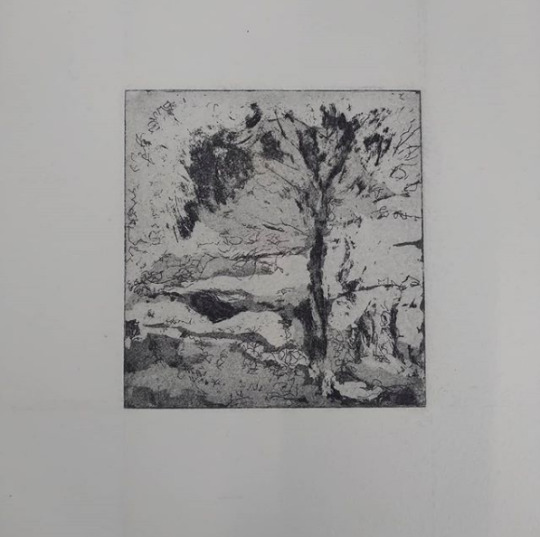
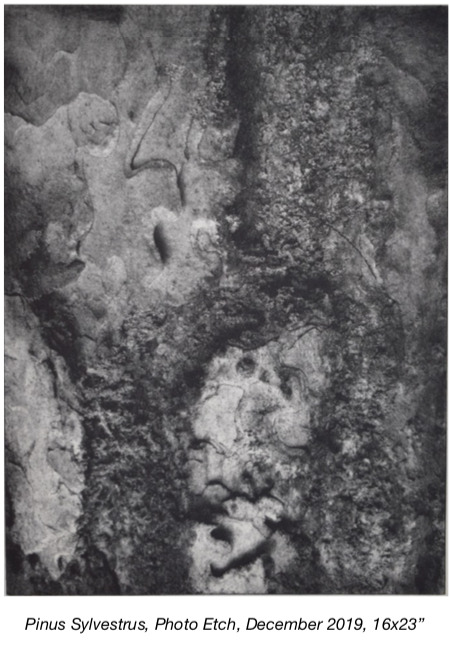








Flora Robson
Painting and Printmaking
Autumn
There is tree at the bottom of my garden which has fascinated me for the past 22 years. I have grown up watching this sycamore (of the Acer Brilliantissimum variety) lose its foliage each year, it’s salmon pink leaves turning yellow to green to a gorgeous emerald by summer. This hardy tree holds this parade of colour every year, living and breathing amongst its herbacious peers. It’s interesting how attached you can become to something as simple as a tree standing at the end of your lawn, the assurance that comes with knowing that as each summer arrives, so will the abundance of fresh array of green leaves, it is rooted, a constant in the ever changing tides of the everyday. For my final year, trees therefore were at the forefront of my mind, in particular Scots Pines- from charcoal plein-eir sketching in Mull, Loch Lomond and Kintyre, to the etching room, where in October I began some experimentation with Photech. There are some etchings I made in october.
Having decided to focus my paintings on the Scottish Landscape for my final year project, I started researching into the Scots Pine, and the history of this tree in Scotland’s landscape. It is known as a pioneer species, due to its ability to regenerate in poor soils, a native of the once vast Caledonian Forest (a title deriving from the Latin ‘wooded heights’.) At the start of the Holocene, Scotland was covered with substantial ice sheet with little vegetation. When this ice retreated, records of pollen preserved in peat bogs have shown that the land was rapidly colonized by Birch, Scots Pine, Hazel and Oak. Over the next 11,000 years human settlement and agriculture practices brought about variation in tree cover. Pollen records show a sharp decline in the extent of the Caledonian Forest over the past 400 years, due to the age of vast clearances of trees on land (Scottish Clearances) as well as natural changes in climate and volcanic activity. With the collapse of many ‘fermtoun’ settlements after the Jacobite rebellion in 1745, there was a huge dip in the regeneration of forests in upland areas, and subsequently a huge loss in biodiversity. In addition to the rise of monoculture farming, the combination of both world wars had a huge effect on the amount of timber left in Britain. The sitka spruce was introduced to create dense plantations for wildlife but only supported a small range compared to the native woodland which was being felled. Such large-scale ecologcail destruction to the Caledonian Forest has resulted in a complete transformation of the woodlands, with only 1% of the native pinewoods remaining, with large habitats suffering at the cost.
In October, I attended a curators workshop at the CCA titled ‘Being Ecological’, led by Artist Kotryna Ula Kiliulyte and A+E collective, discussing the work ‘Being Ecological’ by Timothy Morton, which gives readers an insight into a more genuine and real approach to handling ecological knowledge, how we are all part of the biosphere, and how we interact with ecological health can have a huge impact on our mental health, how ‘teaming-up’ with the non-human elements surrounding us can help us move forward in combating the effects of climate change, and deconstructing the western colonial narrative surrounding land use.
I then spoke to John Thorne, who himself mentioned a tree he remembers from his childhood garden, and how he remembers observing it from a young age how important is remains to him. The emotional response to trees and landscape in general is one that interests me, with my paintings being driven by this connection to a certain view. It’s interesting how tree-planting on even a small scale can be an act of legacy making, in a similar way to traditional landscape painting. Landscape is so transient, so fleeting, and trying to solidify this feeling into a painting seems impossible, it is an attempt at something permanent, a part of the landscape to grasp onto.
I began to research into organisations that offer wood packs to schools, universities and individuals who are interested in tree replantation, in the hope that I could make an active impact on the environment within the GSA community, whether that be around the STOW college building, on Garnethill or further afield at the GSA Highlands and Islands Campus. John put me in contact with FROGGS (friends of Garnethill community) who were hugely helpful in discussing the process of ordering tree packs and regenerating the area of land next to the Margaret Macdonald halls of residence, as well as their involvement with the Council in making Glasgow greener.
Having decided to base the planting project at the GSA Highlands and Islands Campus, I was able to look at the host and trees and wildlife already abundant in the region of the Forres estate. This project would also help me provide links between the Glasgow Campus and the students studying in Forres, in the hope that there can be future sustainable projects and a sharing of resources and space between both campuses. The Woodlands Trust Scotland campaign works to plant and halt the loss of native woods and trees, restoring woodland to peak condition. Having ordered my ‘working wood pack’ from the Woodlands Trust, a mix of Hornbeam, Pedunculate Oak and Rowan, I headed up to Forres to visit the campus and discuss the project with Sir Alistair Gordon-Cummings, the landowner of the Forres estate.
On Wednesday 30th October, I got the train to Forres, a five hour journey which took me the snow capped hills of Aviemore, through the Caledonian Forest. Driving up the lane to the Forres Estate Office was breathtaking, the October light leaking through the gaps in the pines.
Planting was discussed we opted for March, as the harsh conditions in the winter months are too limiting for growth. It was fascinating to talk to Sir Alistair, how the land at Forres has a strong ecological function in terms of having a positive social and ecological impact on the existing woodland and wildlife, as well as promoting future sustainable ways of farming and planting. The estate has over 7000 acres of sustainable woodland and this provides and exceptional resource for biomass, with facilities put in place for converting their timber into chipping. In 2015, renewable energy was provided to the GSA campus, with the introduction of the Berryburn Wind Farm, commissioned in 2014.
It was important to Sir Alistair that my intentions were clear, whether the site was to be an ‘open’ or closed space, an exhibition or an ecological protest. It is hard to draw a conclusion as to what this space will become, there are a lot of uncertainties surrounding planting, i am unsure that these saplings will survive the cold biting winter months of 2020, perhaps a herd of confident deer will chew the saplings up. I asked Sir Alistair a series of questions, and just as I began he placed a small object on his desk. A root of a Scots Pine from 3000 years ago, from Rochlin. A phenomenon, sitting next to his teacup.
I asked him, ‘In terms of History of Farming at Forres, how do you manage the traditional patterns in terms of the future of the land and the soil?
We have just embarked on a new type of farming called ‘holistic’. We are converting the farm froma traditional style of managing the farm to this new form. Well, it’s not really new, just in terms of perception. It involves organic matter and the soil. What we are hoping to achieve in the next 7-10 years is a transformation of the soil, allowing it to grow in a way we want it to. You start by taking soil samples, and from there you find percentages of organic matter that you have at the minute, and then you ‘ween’ the soil so no fertiliser no spraying no direct drilling. This will hopefully mean my yields of corn be higher, the health of the invertebrates will improve, the birds the bees, there will be a general improvement overall. It seems all thoroughly sensible to me.
I then went on to ask,
‘In terms of the history of trees here, can you tell me a bit about them?'
Trees have been here for hundreds of years and essentially what one does with trees is replace what one has before. So for me I find the tree business the biggest in terms of land mass. We grow all the traditional types, I think we are over 50% Scots Pine. It used to be 70% but now it’s 50. Sitcus spruce, lodgeball pine and more and more lark which I like. We have a wonderful bank of stuff, of all shapes and sizes which gives the estate a wonderful autumnul feel. It has always been like that, and I don’t feel any need to re-invent the wheel. And they bring new species to you and sometimes you say fine but sometimes you don’t. That’s part of everyday life.
In terms of coppicing, is it an industrial method you use?
To me it’s quite suburban, when I was born here there were a lot of foresters, and they used to coppice, I call it prune, to make soil logs. But now they don’t because we haven’t got the time or money. So coppicing isn’t a thing we get hugely involved in, we prune hardwoods in normal fashion in order to get oak in 100 years.
I then went on to speak to Fergus Fullarton Pegg, a research associate who focuses on the impact of digital interface on creativity in remote and distributed communities. Last year he started to grow a permaculture garden- a space in which students and staff work cooperatively growing a variety of wild-flowers, vegetables and plants. Fergus is particularly interested in what he refers to as the ‘circular economy’ of textiles and plants and how this can be embedded in a dye garden next to the campus. Addressing the complexities of a sustainable future begins by the deconstruction of product ecology and our dependency on these products. He was interested in the tree planting project, as its intentions sit alongside this idea of sharing values of sustainability and looking to the future of a site and the produce we can garner from it. Fergus mentioned he had planted hedgerows around the permaculture garden and had to be experimental in terms of his tools for the indentation of the soil, switching to a metal pole as an alternative. In terms of the benefits of planting by the campus building, we spoke of the fact that the trees will soak up water (up to half a tonne a day) which will aid flooding, as well as decrease soil erosion. The trees could act as a social project for students studying at the innovation school to work with, as well as admire, with the neighboring crossbills, tree-creepers and red squirrels also hopefully benefiting! What is interesting is the mutability of this project, similarly to the importance of understanding the mutability of a landscape. It is irregular, its rough edges exist in order to have a non-hierarchical understanding of our position as humans in the biosphere.
Spring
Over the next few months I spent a huge amount of time in the etching workshop, creating a series of prints to illustrate each of the 45 saplings that I was going to plant on the Altyre estate, gathering keen volunteers and orchestrating a plant to get the train up to Forres for March 12th 2020.
Clutching two of Toby’s spades, Rebecca’s camera and tripod, plenty of layers and snacks for the journey-we caught the 10:10am train to Inverness from Glasgow Queen Street. As well as the 45 saplings as well as deer protectors which has been nestled in my room for the past week. Our arms were full to say the least.
As the train whistled once again through the hills, passing Perth, Aviemore and Nairn, it was alarmingly snowy. A moment of doubt crossed my mind, if there was snow on the ground these saplings would be off to a chilly start. But thankfully, Forres and Findhorn are known as having a micro climate, boasting a warm spring/summer due to the shelter of the western and northern highlands.
We were greeted at Altyre Office by David Clark, the resident Forester there. Along with his trusty dog, we hopped into the truck and drove up to the GSA Campus, the grey sky starting to descend. We began to plot the distance between each sapling, with a row of hornbeam at the front, followed by rowan and finally oak, 6 metres apart stretching across the edge of the field. Setting up at tripod in the corner of the field we managed to film the process from start to finish, just as the light was fading. The delicate sapling which had begun to flower were placed within the protectors, attached to wooden stakes. David mentioned how in summer they manage to plant thousands of trees each week, covering areas of the estate in new saplings with a team of helpers. Below are images of the final stage. My intention as an artist is only a small part of the process, the planting in a way a performance, a protest and an act of empathising with our environment. I look forward to visiting the site in the near future to see their growth. For my degree show I plan to show the etchings alongside the film of the process in real time. I am hugely grateful for Sir Alistair, David, Rebecca Gill, Toby Mills and the team at the GSA Highlands and Islands Campus for allowing me to embark on this planting, as well as of course the Woodlands Trust. I hope in future for future collaborations within the GSA community surrounding sustainability and the processes we can take in order to take the steps to a greener future.
0 notes
Text
Day 10/40: Train Up A Child
Start at Day 1
Today, we make a giant pivot from politics to child development. When I started writing my faith journey story, I had some main topics in mind as I considered the big issues that caused me to leave Evangelicalism. Today’s topic is, just like yesterday, NOT one of the “Big Three” (homosexuality, hell, evolution). Also just like yesterday, I am struck by how this seemingly peripheral issue had such a profound impact on my deconstruction.
Becoming a mom inspired me to look back at the “Biblical" advice that had been preached to the parents of my own generation. It’s interesting to imagine what it was like for our parents in the 1980s, before life was made so different by having the Internet at our literal fingertips. They didn’t have as many parenting tools at their disposal as we do now, but what they did have was Dr. James C. Dobson.
Oh, Dr. Dobson. Not many men have had a more profound impact on the American evangelical subculture and the world at large. He first came on the scene in 1970, with his book Dare to Discipline. Dobson had grown dismayed at the social and cultural upheaval he saw around him in the 1960s, blamed it partly on permissive parenting, and thought he had the answer: corporal punishment. To be sure, there was more to his parenting philosophy than spanking and paddling, but he seemed to feel strongly that this specific form of child discipline was a Biblical principle, and it was this main piece of advice that distinguished him from the secular parenting experts of the time.
Proponents of spanking (Dobson wasn’t/isn't the only one) hold to a literal-ish interpretation of Bible verses that refer to using a “rod” when disciplining a child. [I say “literal-ish” because usually the recommended modern implements include hands, belts, paddles, but not literal rods, though sometimes a wooden switch or paint stirring stick are called for, and maybe those are technically rods?] The most well-known verse is Proverbs 13:24, which says, "Whoever spares the rod hates his son, but he who loves him is diligent to discipline him.” This is the closest the Bible gets to the popular saying “spare the rod, spoil the child,” which actually comes from a 17th century satirical poem.
Even though research has shown how harmful and ineffective the corporal punishment of children is, and 58 countries have outlawed its use, many conservative Christians continue to endorse it. If anything, the secular world’s outcry against it just strengthens their resolve, because it makes sense to the evangelical worldview that secular (i.e., ungodly) authorities would contradict the Bible’s teachings.
I’ve mentioned before the “high stakes” involved in evangelicalism because of the belief in hell. Step one on their path to being saved is admitting you are a sinner. This applies even to the youngest of children, because the theology of “original sin” teaches that Adam and Eve’s sin in the Garden of Eden resulted in all of humankind inheriting their sin nature. We are all born inherently broken, “fallen” in spirit, soul, and body. In this worldview, it is highly important that parents remain in control of their children, because disobedient children aren’t just rebelling against their parents; their hearts are sinning against God himself. Often in conservative Christian circles, children are {jokingly? fondly?} referred to as “little sinners.” Those who espouse this theology will often point to the demanding tantrums of toddlers as proof that humans have sinful hearts from the beginning. Babies are described as selfish and manipulative because of the way they dominate their parents’ time and attention.
[Look, I get it. Kids are hard work. Sometimes at my weaker moments, I even equate my kids to little jerks, because I find their behavior so infuriating. BUT I’M NOT CLAIMING TO SPEAK FOR GOD. I’d like to think God has more patience than I do, and looks more tenderly on all of us.]
I’d never especially cared for the teaching of original sin, because it seemed unfair to me, but it was one of those mysteries I tried to trust God with. I grew bored over the debates about it in high school and college, partly because I disliked conflict, but mostly because it all seemed so theoretical and distant. Having a child of my own suddenly made it personal. I had to face the implications because she was literally staring into my eyes. What was I going to teach this beautiful baby in my arms about her true essence as a human being? I couldn’t bear the thought of teaching her that she was inherently polluted and broken.
But what did I know? Wasn’t I just being an emotional, sentimental woman? Then I learned that the ancient Hebrew word for God’s compassion and mercy is ra-cha-mim, taken from the root word re-chem, meaning “womb.” But of course. It wasn’t “soft" to feel deep, protective love for my baby; a mother’s love for the child that grew inside her was a reflection of how God herself looked at all of her children. [If God’s mercy metaphorically comes from a uterus, then God gets a feminine pronoun.]
This shouldn’t need explaining, but babies cry to get their physical and emotional needs met so they can survive and thrive. The fact that my infant daughter cried for milk every few hours and that my body automatically knew to respond to those cries was a marvel of creation, not a sign of her selfishness. The idea that "needs drive behavior” doesn’t quit applying when our children grow out of the baby stage. All children (and adults!) have important needs, for things like food, human touch, comfort, safety, connection, and exploration.
So much of parenting (and life, really) turns out to be about the stories my brain tells myself about what is happening. If I believe the child in front of me is acting out of a sinful heart, I’m going to assume negative intent to their actions instead of looking for the message underneath the behavior. Sometimes a kid throws a fit because their blood sugar is low and they need a snack (this is also applicable to adults). Consider how differently we’d respond if we recognized that tantrums are not only normal and sometimes unavoidable, but actually an important and necessary part of how a child learns to deal with their overwhelming emotions?
As my daughter grew older, we noticed that she was experiencing higher than normal levels of emotional “out of control-ness.” That introduced us to a whole new world of therapy, anxiety disorders, neurologists, sensory processing issues, and pediatric sleep specialists. What showed up in my child as anger, aggression, and tantrums turned out to be the result of anxiety fueled by a neurodevelopmental disorder, a highly sensitive nervous system, and fearful, negative self-talk. I can’t imagine the harm to my child’s heart if we had been treating her outbursts as “sinful” misbehavior.
I’m so thankful that I ignored the mainstream “Biblical” parenting mindset that would have utterly failed my daughter. My heart breaks when I consider all the children harshly disciplined for what their parents were primed to see as “sin,” when in reality their poor little bodies were dealing with something else entirely: e.g., sensory processing disorders, trauma responses, ADHD, and autism, just to name a few.
It’s true that many of these conditions are things that we've only really started understanding in the last few decades, so maybe it’s unfair to expect Dr. Dobson’s book, written 50 years ago, to align with the new information we have today. That’s exactly where the idea of “Biblical” advice broke down for me. Evangelicals hold the Bible in very high regard, and many like to refer to it as “God’s instruction manual for life.” The whole conservative Christian system of belief is predicated on the idea that the Bible’s truths and morals are timeless and that’s why we should take them so seriously.
My experience with my daughter demolished my blind automatic trust in all things labeled “Biblical.” I wasn’t anywhere near considering throwing out the Bible yet, but I was becoming more suspicious of the advice given in its name. Learning about the differing Christian beliefs about politics and child development seemed to be proving that Christians could find Bible verses to support any position they wanted to hold. If "cherry-picking” was so prone to happen, then how did we figure out which ideals and values were the ones God truly wanted us to hold? This was the question driving me as my deconstruction began.
Previous | Table of Contents | Next
0 notes
Note
asoiaf for the meme thing :)
ALL OF THE QUESTIONS? ALL OF THE QUESTIONS. *cracks knuckles* beware: cersei fans pls skip this post it was named salty asks and I’m not trying to sound nicer as I’d try to be usually
What OTPs in your fandom(s) do you just not get? see the crackship question for an appropriate answer to this since out of the ships that actually are canon I do *get* why they’re a thing
Are there any popular fandom OTPs you only BroTP? jon/sansa, any stark*cest tbh
Have you ever unfollowed someone over a fandom opinion? in asoiaf? yesterday I unfollowed someone because I realized they changed their blog title to an anti jon/sansa thing (WHY DON’T SHIT ON OTHERS’S SHIPS) and on top of that they hated jaime and at some point made a post dissing him in the tags and then basically wishing brienne ended up with hyle and NO THANK YOU
Do you have a NoTP in your fandom? Are they a popular OTP? t/ramsay, l/annincest and sansa/marg, t/ramsay is like 50% of what theon fans are into so I guess it’s popular but I don’t mind since the fans are chill and tag everything, l/annincest isn’t as popular as it could be and I honestly hope it keeps on declining because I’m petty and salty and the more time passes the less I can stand it, sansa/marg is sadly very popular and it’s half the reason why I can’t read a lot of t/hrobb stuff around because it’s the sideship and I can’t stomach it for reasons related to how obnoxious the shippers were during s3
Has fandom ever ruined a pairing for you? in asoiaf? no but the part of sansa fandom who in s5/6 decided that whichever character shared a screen with her (from jon to theon to brienne) had to be dissed on principle was putting up an admirable effort to ruin the character for me
Has fandom ever made you enjoy a pairing you previously hated? *thinks* .... nah, but the t/hramsay fandom is a+ and has done wonders in not making me see it even if I stalk the theon tag which means I tolerate it a lot more than I used to
Is there anything you used to like but can’t stand now? the show
Have you received anon hate? What about? *thinks* meh someone once sent me hate because I was arguing theon didn’t owe the starks anything and then there was the slew of j*aime/cersei anons a couple years ago who kept on sending asks like ‘he can’t be with brienne because she’s too ugly’
Most disliked character(s)? Why? cersei. good lord I guess she’s interesting for what she is but the only kind of *horrible people* I enjoy reading are *competent* horrible people and not only she’s incompetent, out of her mind and so self-absorbed she can’t even be an efficient villain, but like the fact that she’s an abusive narcisist asshole who fandom likes to present as a FEMINIST MODEL before declaring that she and jaime MUST BE THE SAME PERSON SO HE HAS TO BE AN ASSHOLE doesn’t help, also I find her povs boring af and I’m not interested in her head at all, and cherry on top anyone who laughs about catelyn going insane when she saw robb die in front of her is dead to me as anything. also she has the most fucking obnoxious subfandom in this fandom and she’s basically everything I detest in a) a person, b) a fictional character, so. yeah. hahaha. years ago it’d have been ramsay but the ramsay fandom is a LOT less horrid than hers, so.
Most disliked arc? Why? dany’s adwd arc, because it was too long and too much filler and I slept through about 70% of it like I honest to god don’t remember half of what happened.
Is there an unpopular character you like that the fandom doesn’t? Why? THEON GREYJOY because he’s the objectively best written and conceived character in there never mind the most original one grrm’s ever come up with and a delicious deconstruction of everything he sets to deconstruct and he has the best identity arc ever and I’m a sucker for identity arcs and fandom hates him sooooo *sigh*
Is there an unpopular arc that you like that the fandom doesn’t? Why? every time I hear brienne’s chapters are boring I want to weep and bang my head against the wall because they’re in my top three asoiaf povs and like it was the first time I ever related to a fictional character because of things we had in common and tbh I thought it was exquisitely done and the exploration of post-war westeros was a+ and I loved everything about it
Unpopular opinion about XXX character? I don’t have a character so I’m just gonna pick one I have an unpopular opinion about hmmm I don’t think bran’s chapters are boring and I don’t hate jorah
Unpopular opinion about your fandom? oh god idk about the whole fandom but let’s just say that for how much I bitch about it, it’ 100% better than ANY other fandom around rn
Unpopular opinion about the manga/show? the SHOW? lol, if I say I don’t like 90% of what they choose it’s not UNPOPULAR anymore I guess? idk I think yara’s a terrible character and has nothing to do with asha but everyone seems to love her so
If you could change anything in the show, what would you change? LOL I’d reinstate jeyne westerling instead of that horrid talisa stuff and then I’d put winterfell back where it belonged as in with jeyne poole and theon being the main character talking about MAIN STUFF, I’d get someone to inform theon that ramsay died, I’d have killed ramsay through jon beheading him and I’D HAVE SCRAPPED WITH FIRE THAT RIDICULOUS ENDING OF S5 WHERE THEY KILLED SHIREEN SO THEN THEY COULD MAKE BRIENNE KILL STANNIS IN THE MOST OOC THING I EVER SAW IN THAT SHOW sigh ah and jon*dany wouldn’t be canon by now I guess and lady stoneheart would have been a thing
Instead of XYZ happening, I would have made ABC happen… .... yeah right instead of talisa I’d have had jeyne, instead of sansa and theon I’d have had jeyne and theon and jaime would have dumped cersei properly two seasons ago
Does not shipping something ‘popular’ mean you’re in denial and/or biased? no, but harping at people who ship something popular and not canon telling them they’re in denial/biased is really fucking irksome
What is the one thing you hate most about your fandom? sorry I can’t pick ONE. on the same level: *book readers* who obviously haven’t read the entire thing, people who think jaime is the same person as cersei, whoever in the l/annincest fandom sends the monthly anons telling jb shippers how biased they are and that no one gives a fuck about jon connington. ah, and that people still think theon betrayed *the starks*
What is the purest ship in the fandom? jon/sam
What are your thoughts on crack ships? listen I enjoy crack ships myself but I hate it when some become more popular than actual sensed ships when they’re a thing because of aesthetics and I REALLY hate that in this fandom a lot of crack ships are more popular than ships that make sense or are canon (see: jaime/sansa - WHY IT MAKES NO FUCKING SENSE - vs jon/sam or jonc/rhaegar, or the fact that rhaegar/HARRY POTTER has more effective fics than jonc/rhaegar, or jaime/sansa probably having more effective fics than jon/ygritte since the latter is always a sideship or IN THE PAST and if you take the dany/jon and sansa/jon out of the ao3 search you get... 300 maybe, and actually add sam/anyone in the list of ships that don’t get following HMMM GUESS WHY) that said jonc/the blackfish is the crackship of the century and I’ll go down with it (and I enjoy a lot of others ie jon/asha XDD)
Popular character you hate? if she counts as popular, cersei. otherwise dany’s not my fave but I don’t hate her or anything I just don’t like her that much. ah no wait show!margaery like I honestly don’t get what’s so special about marg period
Unpopular character you love? THEON <3
Would you recommend XXX to a friend? Why or why not? of course I’d recommend asoiaf to people I do love it XD
How would you end XXX/Would you change the ending of XXX? it’s not ended already but I want jon ALONE on the throne, dany back in essos, the other starks in winterfell, theon getting a break and jaime and brienne being ridiculously happy on tarth (I KNOW IMPROBABLE IDC)
Most shippable character? def. jon like I ship him with a bunch of people too bad none of them are sansa or dany #hahahahahaha
Least shippable character? idk out of people I actually ship with anyone period def. brienne like if she’s not with jaime or he’s not involved I really don’t see her with others (tho I’ll admit to watching the tormund/brienne crack vids because they’re amusing), also meh arya because I only ship her and gendry?
WOW I COULD MAKE IT XD
7 notes
·
View notes
Text
Okay, so spoilers warning for anyone who hasn’t watched the newest episode, Putting Others First - Selfishness VS Selfnessess Redux. Please go watch it, it’s AMAZING. They really outdid themselves this time! (Fair warning, it’s about 50 minutes long.)
Now, without further ado, let’s start from the beginning!
The entire Roman VS Patton part of the episode is shockingly civil. I was expecting a lot more aggression and anger? But instead, Patton and Roman are extremely civil. I know Patton is civil because he’s scared of being too pushy. On Roman’s side of things, it reads to me like he’s afraid of openly disagreeing with Patton? It might be because he’s struggling with his own morality, and he feels like disagreeing with Patton too much might make him a bad person. But I might be totally off-base here.
I love the new song, and I’m hoping very hard for a Spotify release! (Please don’t let this be the next New Year’s Resolutions song, I’m still a little sad it’s not on Spotify. I want to jam out to the Sodes dragging Thomas, dang it!)
The video game visuals are SUPER IMPRESSIVE. Like, seriously, I now understand why it’s taken nearly a year to make this. The part where Patton freaks out and the screen glitches as the scene changes is a MASTERPIECE.
Logan being a hint box was a genius idea. It allows him to take part in the episode, act as a neutral party, make some vital points and give sources and context for some points while still not taking up too much screen time and letting Patton, Roman and Deceit take centre stage.
Virgil is not in this episode. Virgil has been sulking in his room for like a week. Virgil was just as surprised as we were when the episode dropped.
Deceit. Holy shit, DECEIT. Where do I START with him?
Let’s begin with his name reveal. That’s right, we got his name. It’s Janus, which fits him very well! (I’m kind of bitter it’s not Ethan, because that’s been my theory since I watched CLBG, but Janus is a good name. It’ll grow on me.)
His entrance was ASTOUNDING. He butts in while Patton is losing his shit and Thomas and Roman are unsuccessfully trying to deescalate, deconstructs Patton’s entire argument, and successfully stops Patton dead in his tracks and points out that Thomas ISN’T OKAY.
His name reveal scene is… so good. SO GOOD. You just have to watch it, I don’t think I can do it justice.
He’s pretty much officially canonically sympathetic by this point. If anyone’s lost audience sympathy after this episode, it’s Roman. (More on that later.)
Seeing him and Patton get along, even if it’s brief, is oddly sweet.
Okay, Patton time!
He’s trying his best, he really is. I’ve gotta give him credit, he may not know what the right thing is, but he’s trying so hard to do right by Thomas and it’s so sweet.
Interestingly, Patton and I happen to disagree a lot on moral dilemmas such as the Trolley problem. I didn’t know that until now!
I feel a little bad, watching him stumble and desperately try to patch together his rapidly-crumbling morals and worldview. You can tell this is the first time in a long time, possibly since Patton came into being, he’s been questioned like this and had his morals examined so thoroughly. Still, he kind of needed that wake-up call.
As for Logan: I feel really bad for him? Roman is mean to him, and then no one thinks to check on him (to be fair, they kind of had bigger fish to fry at the time, and IIRC, Patton asked Deceit if Logan was okay after the boss battle segment.)
Anyways, Logan left thinking that none of them cared enough to worry about him, and that makes me sad.
Okay, time for the elephant in the room: Roman.
First of all, I think he’s going through some serious inner turmoil right now. He seems to be questioning whether he’s a good person or not, and so he’s wary of disagreeing too openly with Patton because he feels like disagreeing with the embodiment of Thomas’ morality too much might mean he’s a bad person, and he lashes out at Deceit and tries to exclude him because he’s pretty much the embodiment of the moral greyness he’s currently struggling with.
That said… he’s an ASSHOLE to Deceit. As much as I understand he’s going through some shit right now, and even though Deceit has been cruel to him in the past, that doesn’t excuse his actions. He insists that letting Deceit have a seat at the table would make Thomas a bad person, is generally cruel to Deceit, makes fun of his name, and never apologizes for any of it. And Deceit deserves an apology!
Let’s properly discuss that name reveal scene, because I was appalled by Roman’s behaviour. (Yep, I’m breaking out the vocab words.) Roman insists that they can’t trust Deceit (which, to be fair, he’s not wrong). Deceit acknowledges this, and in a show of good faith, removes one of his gloves and tells Thomas, Patton and Roman his name. Let’s be clear: this is a BIG DEAL. Not only are names super important in this series, with each name reveal being very personal and marking a big development for the Side in question, but we have NEVER seen Deceit without his gloves. EVER. So, Deceit tells them his name, it’s obviously a serious moment, and what does Roman do? LAUGH. He then proceeds to mock Deceit’s name, claiming it sounds like a middle-school librarian. When Thomas and Patton are horrified and tell him off, he acts like they’ve betrayed him by siding with Deceit and then leaves without apologizing to Deceit at all.
I’ve heard at least one person compare Sanders Sides’ name reveals to coming out, and I think that’s a good comparison here. Deceit has just revealed something extremely personal in a show of good faith, something he had every right to keep to himself, something he DIDN’T NEED TO TELL THEM, and the first thing Roman does is make fun of him. Imagine if he’d done that to Virgil! Virgil would likely never get over it if someone did that to him, and the other Sides and Thomas would probably never forgive Roman for it.
Actually, Roman’s treatment of Deceit in this episode is eerily similar to his treatment of Virgil back in Season 1. Let’s hope it doesn’t take Roman as long to realize the error of his ways this time.
More on Roman! I was sort of expecting Patton to have more of an issue with Deceit’s presence than Roman, so Roman flipping his shit and Patton being chill with Deceit was kind of strange to watch.
Also, was Roman alluding to ducking out when he said that maybe he should just hand the wheel to Patton? It sounded like that.
Finally, the end card with Lee and Mary Lee coming over to hang out with Thomas is oddly sweet, as is Deceit and Patton conversation. I hope the two of them get some more screen time.
WAIT
THE NEW SANDERS SIDES JUST CAME OUT LIKE TWO HOURS AGO
HOW DID I MISS IT
I AM SO NOT READY
I’M GOING TO GO WATCH IT AND TELL YOU GUYS HOW I’M FEELING AFTER
I’M GONNA DIE
#sanders sides#sanders sides spoilers#remus sanders#roman sanders#deceit sanders#patton sanders#virgil sanders#logan sanders#spoilers#swearing tw#caps lock
2 notes
·
View notes
Text
Queen Regent, Rebel Leaders
(so @evaceratops has this incredible AU that is literally everything I have ever wanted from a Star Wars AU, and ever since she told me about it I haven’t been able to get it out of my head - to the point where I may or may not have shed real life actual tears thinking about its repercussions on my favorite characters. It can best be described as “an afterlife that is way more violent than any afterlife has the right to be” and -
“CLUSTERFUCK IS /RIGHT/ OK this au is just like. 50% fluff, 50% angst, 90% shenanigans, and 200% TOTAL CHAOS”)
So of course I had to write the scene that would cause the most tears - Padme meeting her twins for the very first time. This, uh, may have gotten a little out of hand. Happy late birthday, Eva!!
When she had first woken up in this world, in this wherever and whenever world that as far she could tell obeyed no ordinary laws of life and death, Padme Amidala had not been alone, and for that she was eternally grateful. How ironic, then, she thought grimly as she tossed yet another rag caked in heavy white and red makeup into the bin, how ironic is it that I now have eternity in which to be thankful? Captain Rex and Ahsoka must feel the same way. But understanding what had happened wasn’t as difficult as she would have thought, had someone told her in life, her first life, that her afterlife would be almost identical.
Except, of course, for the ‘never dying’ fine print.
She supposed she couldn’t complain - she’d been granted another chance, a chance to refocus and recenter herself, to fight another day. She’d woken up from a thick fog, her throat and her stomach burning with fading memories of searing, lancing pain. Even though it had been well over a year now, sometimes she still woke with hot tears coursing down her cheeks and her hands scrambling over her flat belly - desperate to find the children she had never known. How strange it had been. To go from that familiar and cherished weight to nothing, to nothing at all. Most days she could manage, but some were worse than others. Rex and Ahsoka tried to understand, precious things, but how could they?
There was always work to be done, and Padme threw herself into that. Every enemy they had ever fought was in this world, too. And they were just as greedy as they had been on the other side of the divide. Padme Amidala’s arena had come with her, and she fought with everything she had.
She had gotten very good at pushing away the ghosts of her twins. She didn’t let herself think about where they were now - if they had even survived. Her memories of her own death were foggy, and she didn’t spare much thought to them. That path of thinking led to nothing but pain.
Today’s negotiations had gone very well indeed - they almost always did when she pulled out the retinue of Naboo royal gowns and headdresses, when she split her lip with red. She had modified most of the gowns by now - taken in the waists, removed layers of taffeta and silk, streamlined them in battle-ready dresses - but whenever she entered a room as Queen, the effects were never diminished. Head back, shoulders back, core tight, crowned with a look of barely concealed anger, held back by her lips and teeth. And Padme Amidala had every right to be angry.
And when Queen Amidala was escorted by a clone Captain and a Jedi Padawan?
The other side never stood a chance.
The last of the makeup came off in one swipe and she stared at herself in the mirror. Her hair was pulled back into what Ahsoka had affectionately nicknamed the double-dumplings. “I think it’s my favorite style. That’s your ‘do not even think about messing with me’ hairstyle,” the young Togruta had said in between massive bites of dinner the night before. “Simple, yet effective.”
“Very effective,” Rex had agreed, nodding with sage wisdom.
Every day, they acquired more allies, convinced more and more systems to aid them in their attempt to keep the droids from the Rebellion. It was difficult, dangerous work, but when death was no longer on the table, they had nothing left to lose. They knew how the story played out on the other side, and like hell they were going to let that happen here. Their communications with the Rebellion, who were clustered around Yavin 4 and Endor, were sparse but their relief to find help was palpable. Before Padme and the others had begun to hold off the droid army, the Rebellion had nearly ruptured under the pressure of holding off two enemies on two fronts. Their messages were heavily encrypted and anonymous, but the special coded sequence placed at the beginning of every one let Padme know which were true Rebellion intel and which were the Empire’s honeypots. They’d been able to push the droids back and hold them there for nearly three months now, and every day Padme entered negotiations with skeptical and concerned system leaders in her heavy white makeup and split lower lip.
A soft knock startled her out of her reverie. “Senator?”
“Yes, Rex?”
The door cracked open just enough for Rex’s blond head to peek through. “Sorry to disturb you, Senator, but-”
Padme rose, the heavy burgundy robes rising from the pool at her feet. “Please, Rex - I think we’re all well past the point of formalities now. Come in.”
He nodded firmly and took three quick steps in. None of them bothered with formal armor anymore. The clone captain was dressed in deep blue and gray robes, lightweight but easy to move in, his twin blasters in their permanent place in the belt on his hips. His umber eyes were locked on something she didn’t recognize and couldn’t place. Fear? Or respect? He clasped his hands behind his back and got right to the point. “There are some… some, ah, people here to see you.” The way he emphasized the word made her think, Finally - we’re getting to know the face of the Rebellion. They’ve sent a convoy.
“Their names?”
Rex’s face contorted just the slightest, his eyebrow twitching up in quickly-hidden annoyance. “Haven’t given ‘em up yet, Padme, and they refuse to, until they see you.”
That gave her pause. “They asked for me by name?”
He shook his head again, his annoyance clearly written on his face now. “They said they needed to meet with the ‘leader of the Old Republic.’ I would have turned them away - but they had the code. I think they followed the signal to us - which means we’ll probably have to move operations sooner rather than later. But they asked to see you.” Padme opened her mouth to protest and Rex continued, like he already knew what she was going to say, “They asked specifically for the Queen Regent, Padme.”
She closed her mouth and focused her mind. She couldn’t be distracted by thoughts of her old life, the other life now. She had to focus. The Rebellion needed her. “Alright, then. This ought to be interesting. I want you there with me, understand?” She started walking towards the door, glad she had not removed her gown - the makeup would have been a nice touch, for intimidation, but there was nothing to be done about it now - there was a Rebellion to run.
He nodded and led the way, down the hall and into the cavernous hall that served as their base of operations. Ahsoka was there already, leaning against a pillar, shrouded in darkness, watching the newcomers with narrowed eyes.
They stood across the green hologram that took up much of the floor. Right now, it was displayed running numbers, thousands of them - estimates of battle droid productions Padme had wanted to keep an eye on - and a slowly spinning ‘gram of Geonosis. Rex and Padme descended the stairs, keeping their eyes focused on the two Rebel officers. One male, one female - the lighting in the room kept their faces shadowed, but she could clearly see the stark white dress and silver belt of the woman. The man was covered head-to-toe in black - her stomach churned slightly at that, images of Anakin on Mustafar running wild in her mind before she reined them in.
“I was told you wanted to speak with me. Captain Rex has told me your security codes met our standards, but I need to know your names before we continue. Otherwise I will have you removed from our headquarters. If you are who you say you are, then we have nothing to worry about.” Padme took the last step towards the projection, narrowing her eyes through the green mist of the deconstructed planes of Geonosis. “I assume you would not so gallantly walk into our base without being prepared to prove you are who you say who are.”
From her place against the column, Ahsoka smirked, leaning towards the two Rebels with a faint gleam in her eye. Rex had taken up his place at Padme’s side, his signature scowl fixed firmly on his face.
There was a brief pause and then the woman spoke. “I am the Princess of Alderaan, and we were sent by Mon Mothma of the Rebel Alliance to confer with you, Queen Regent of the Old Republic.”
Padme frowned. Princess of Alderaan? As far as she could remember about the other life, Bail Organa had had no children - Breha couldn’t conceive, I remember him telling me - this was the worst part about this new life. Things had happened after her death that she couldn’t possibly hope to know, that she was always left playing catch-up with, despite her attempts to glean historical records from the Empire’s clutches. What wasn’t destroyed was mutilated so heavily beyond recognition - focus, Padme! Here and now! Not on what was.
“Princess of Alderaan, do you not have a name?”
“I will give you my name when you give me yours, Queen Regent.”
Then the boy spoke. His voice was much gentler, kinder than the girl’s. He couldn’t be more than twenty years old - nineteen, maybe. “Queen Regent, please. We know you have as much need for secrecy as we do. The Empire is hunting us all. Mon Mothma merely sent us to converse with you, about our mutual needs and desires.”
Padme was silent as she contemplated them through the green mist of the holoprojector. They spoke the truth, but she was growing tired of these formalities, of these political games. If Mon Mothma - her old colleague, her cherished friend - had truly sent these two, why weren’t they being honest? Rex and Ahsoka were quiet, waiting for Padme to say something. They trusted her completely at this point, and she could not risk this by entertaining two children who thought they might play spy. She wished she could ask Ahsoka what she sensed from them - shrouded as they were in darkness, they might as well have been enigmas. They would have to leave, immediately, find a new base of operations - it was too risky to speak more. “I do not have time for these games. If you do not tell me who you are-”
“Then we have reached an impasse, Queen Regent.” The girl’s voice was as sharp as ice, cold and unyielding. “The Rebel Alliance thanks you for all you’ve done but you are in no way in as much danger as we are. You are merely janitors for the Alliance, you take care of the mess that is the droids. You work for us, and you will answer to us.”
Fury exploded red across Padme’s vision and she was dimly aware of Rex shouting, “That is enough! If you continue to show this disrespect I will remove you myself-”
The boy turned to the girl and said, the desperation in his voice as clear as a bell above the fray, “Leia, it’s not going to work.”
Leia Leia Leia Leia
It snapped into her like a blast bolt.
The blood drained from Padme’s face.
There was no way.
It couldn’t be.
Her ears started to ring and her hands flew to her stomach, searching for her babies, for Anakin’s children, for her children, for the -
For the twins.
Her stomach constricted and she thought she might choke on the words, “Leia? Luke?”
The words dropped into the heavy silence. Rex had taken her by the elbow, he was saying something but she couldn’t hear him, it was like her entire world had been magnified to the two shadowed faces beyond the hologram, two pinpricks of existence that had hollowed her veins and stopped her heart. Her mouth was dry. “Rex, shut off the projection.”
“-Padme?”
“Shut it off.” The words tasted like blood, like she couldn’t get enough oxygen, like she was lying on a cold metal table on an unnamed asteroid, Obi-Wan’s haggard face fading in and out of her vision -
Rex thumbed the projection off and it fizzled down, throwing the room into shadows. No one moved. Ahsoka had pushed off the pillar and had taken one cautious step towards Padme. Can she feel my pain? Her knuckles were aching, clutching the heavy brocade at her belly, where she had carried twins she had called Luke and Leia before falling asleep, before dying, before waking up here-
The boy spoke first, breaking the silence with six words that shattered Padme to her very core. “How do you know my name?”
She choked back a sob. What question could she ask, when her mind was a blank slate of pain, when she still tore at her stomach, desperate for her children? They wouldn’t know her. Her twins would have no idea who she was. She had died, Force, she had died after naming her children. What question could possibly prove that heritage, to answer her fears, to fill the sick void in her heart?
“Luke. Are you a Jedi?”
He straightened his shoulders - oh, gods, oh gods, it was like seeing Anakin again - and said proudly, “I am. Like my father before me.”
Ahsoka let out a volley of curses and Padme asked one more question. “Do you not know who I am?” Rex was still gripping her elbow, one hand on his blaster. If he moved away, if he removed his arm, Padme was certain that she would collapse on the spot. She had to be sure.
It was Leia who answered this time, the venom gone from her voice, curiosity ebbing into its place. “I… I’ve seen you before.” She paused and Padme thought she might die. She grabbed Rex’s hand and stared into the gloom, her stomach tightly coiled in her throat as the girl - how many Leia’s could there be? - thought and continued, cautiously, “A memory. I remember…” And she took a hesitant step around the projection, and another, and another, until she was facing Padme head on. Her dark hair was tightly wrapped in that Alderaan style that Bail loved - but her face.
It was Anakin’s face.
Leia opened her mouth and dropped her next words into the heavy silence. “...kind, beautiful, but sad…” She blinked and stared at Padme, her eyes crinkling in the same way Anakin’s did when he was teasing her - “You’re-”
“Leia.”
“You’re our mother.”
Padme’s heartbeat thrummed wildly and she choked on her tears, falling back into Rex, who caught her and held her as she wept, as she stared into the faces of her children - how could she have been so foolish - they were here, they were alive, her children - and she threw her arms around Leia and pulled her tight to her chest, relishing in her heartbeat, in her timid hugs - and she looked across at Luke, brave Luke, precious Luke, and called his name, and he walked to her, stunned - they were teenagers, they were real, they were alive - Padme was holding her children and Rex had stepped back, they fell to the floor as one - her mind was singing and her heart was overflowing.
She pulled back and cupped their faces in her hands, her eyes darting between them, desperate to memorize their features. She laughed through the thick tears pouring down her cheeks - how long ago she had resolved to keep the pain of losing her children locked away tight in her chest - as she stared at them, her children, her babies - not babies anymore, but Rebel leaders. Fierce little warriors, carbon copies of Anakin and her, like my father before me - Luke had a lightsaber clipped to his belt, how could she have missed that-
Padme held her children in a mother’s fierce, unyielding grip, realizing for the first time that she had never held them before she left that other life. That this was the first time she had ever held her twins. Nineteen years old and taking on the Empire. She smiled, really smiled, for the first time since she had crossed to this life.
Padme kissed her twins on their foreheads and whispered, “I am so proud of you.”
#naberiie writes fanfic#star shield au#evaceratops#uH THIS MIGHT HAVE GOTTEN OUT OF HAND AND I DONT KNOW ALL THE DETAILS OF THE TIMELINE BUT I LOVE THIS AU SO MUCH I HAD TO WRITE IT#plus im always a sucker for angsty reunions#/esp/ when one of them is supposed to be /dead/#ANYWAY HAPPY LATE BIRTHDAY I HOPE U LIKE IT
28 notes
·
View notes
Text
Save money and protect the environment by repurposing your old outdoor gear
These have seen better days. The good news is, they will again. (Th G / Pixabay /)
Most hikers and campers have at least one torn and tattered piece of gear they refuse to let go. Those are the items that tell the stories of what we’ve seen, where we’ve been, and the muddy canyons and thorny bushes we’ve gone through to get there.
But just because a beloved jacket or tent has seen better days doesn’t mean it should go in the trash. In fact, you can often repurpose your old gear by using it to create something new. This has the simultaneous benefits of giving new life to a valuable item, saving you cash, and keeping perfectly usable materials out of the landfill.
Good for you, your wallet, and the environment
New gear is expensive, and so are the materials to make your own. So it only makes sense to save yourself potentially hundreds of dollars in new equipment by repurposing and salvaging what you can from items that seem to have fulfilled their purpose.
But it’s not only your bank account you’ll be doing a favor—there’s also the waste factor. Synthetic materials like those often used in technical clothing and gear are, well, synthetic, which means they don’t decompose like natural fabrics. When you dispose of them, they pile up in landfills, overflowing them and hurting the environment..
The average American throws away 70 pounds of clothing and other textiles every year, so if more crafty outdoors people chose repurposing over trashing, it could make a big difference.
And while saving money and helping the environment are great reasons to preserve buckles, belts, and fabric, you might find yourself repurposing worn items for more sentimental reasons. Our gear has helped us get through mountains, valleys, and everything in between—no wonder it’s hard for us to let go. But with a little creativity, you don’t actually have to.
“It’s cool to give old things new life and a new story to tell,” says Chase Anderson, program coordinator of the Outdoor Product Design and Development department at Utah State University.
And if there’s anything outdoor people love, it’s a good story.
Repairing vs. repurposing
Before you deconstruct a perfectly adequate piece of gear in order to salvage its parts, make sure the item cannot be repaired. Sometimes washing or re-waterproofing items like tents and rain jackets, or patching small holes in sleeping bags or puffer coats, can make them last months or years longer.
Still, sometimes, it’s time to call it—your beloved stuff sack or backpack is worn beyond repair. You might think all you can do is toss it, but there are likely many parts and pieces that are in good working order and perfectly usable on other outdoor gear or DIY projects.
Identifying useful materials
There are a lot of yards of waterproof fabric up for grabs here. (Laura Pluth/Unsplash/)
Before you drop your gear in the garbage, give it a once-over and look for anything you might be able to use—you’re looking for things like large squares of fabric from a tent floor or rainfly, the internal frame of a backpack, zippers and buckles from a hip pack, and straps and webbing from an old pair of sandals. You can often salvage zipper pulls, metal poles, bungees, hook-and-loop strips, and elastics, too.
After you’ve stripped your items down, see if you can recycle any of what’s left. Often, aluminum or titanium tent poles, broken plastic buckles, or metal bits and pieces fall into this category. Still, we recommend you check with your local waste authority before dropping items in the recycling bin.
Even if you can’t use some (or any) of the parts you’ve collected, consider donating them to programs like USU’s outdoor product design and development department—which teaches students design principles, aesthetics, and technical skills in the outdoor product design space—or a local repair or craft shop.
Develop your skills
After you’ve stockpiled a few materials and you’re ready to start creating new from old, you might be tempted to jump into a project, but Anderson recommends first building a skill set that will help ensure success.
Sewing is a big one, but don’t think you have to be an expert to make gear. “Start simple,” Anderson says. “And slowly move up to items with zippers, or buckles, or multiple seams.” That includes things like jackets or backpacks.
In general, a solid base of tools and skills is never a bad idea. YouTube is a great resource for learning how to do everything from sewing to tying knots. If you’re not much of an online learner, check out your local craft supply stores and colleges—they usually offer courses for students of any age.
Project ideas
The key is to start with small project. Leave that DIY camping tent for when you master the sewing machine. (jacqueline macou / Pixabay /)
If you’re just developing sewing skills, don’t start by making your own waterproof multi-pocket jacket. Instead, practice by using fabric from retired gear or clothing to patch holes or tears in newer items. Then you can move on to simple projects, like cutting a pattern out of a threadbare base layer and sewing a face warmer. Anderson’s students have made beanies by cutting and sewing a pattern out of an old sweater, or crafted covers for ski goggles and sunglasses out of jacket lining and an old bungee cord or shoelace.
Once you’ve mastered basic skills and projects, try your hand at more advanced endeavors like sewing stuff sacks, replacing zippers, crafting simple gaiters, or making a hip pack.
And don’t be afraid to think outside the box. Anderson has seen students replace malfunctioning zippers on jackets with buttons or snaps, and come up with an idea for a new chalk bag after digging through boxes of scraps.
I recently had to retire an old backpack. Most of the fabric was worn, torn or tattered, and the bits that were still in good condition were too small to use for other projects. However, I was able to remove several yards worth of straps and webbing, a dozen or more buckles and D-rings, some usable elastic, foam, and the lid of the backpack. I cleaned many of these pieces and used them with some fabric from a leaky inflatable outdoor lounge to make a simple ultralight daypack that would have likely cost me around $50.
One thing to keep in mind, though—never use repurposed materials to make any gear or equipment meant to save your life. This includes items like climbing harnesses, safety ropes, and avalanche airbags. These items must be in perfect condition to perform properly, so you should always buy them new.
Tips and tricks
Obviously, the idea is to make something new using as much recycled material as you can, but if you start a project and don’t have everything you need, don’t hesitate to visit your local craft or art supply store to get it. And if you’re worried about mismatched fabrics, don’t be—part of the beauty of repurposed products is their uniqueness and the story behind it. And if that doesn’t convince you, consider outdoor brands like Cotopaxi, which are famous for their beautiful, mismatched gear made with fabric scraps from their other products. If they can get away with it, so can you.
As for the actual making, Anderson recommends you design your project in cardboard or paper as you practice and experiment with forms and construction. Don’t jump straight into using the expensive materials before you know what you’re creating.
And if you’re struggling for ideas or aren’t sure where to start, find inspiration in the outdoor community by searching for influencers and websites (like Patagonia WornWear or gear repair shops) that celebrate up-cycled and repurposed gear. Browsing through their feeds will definitely help you see products and materials in a new way.
Once you start seeing scraps not for what they were, but for what they can be, you’ll not only save cash on new and original gear and keep non-recyclable materials out of the landfill, you’ll also be giving the items you love a new life.
0 notes